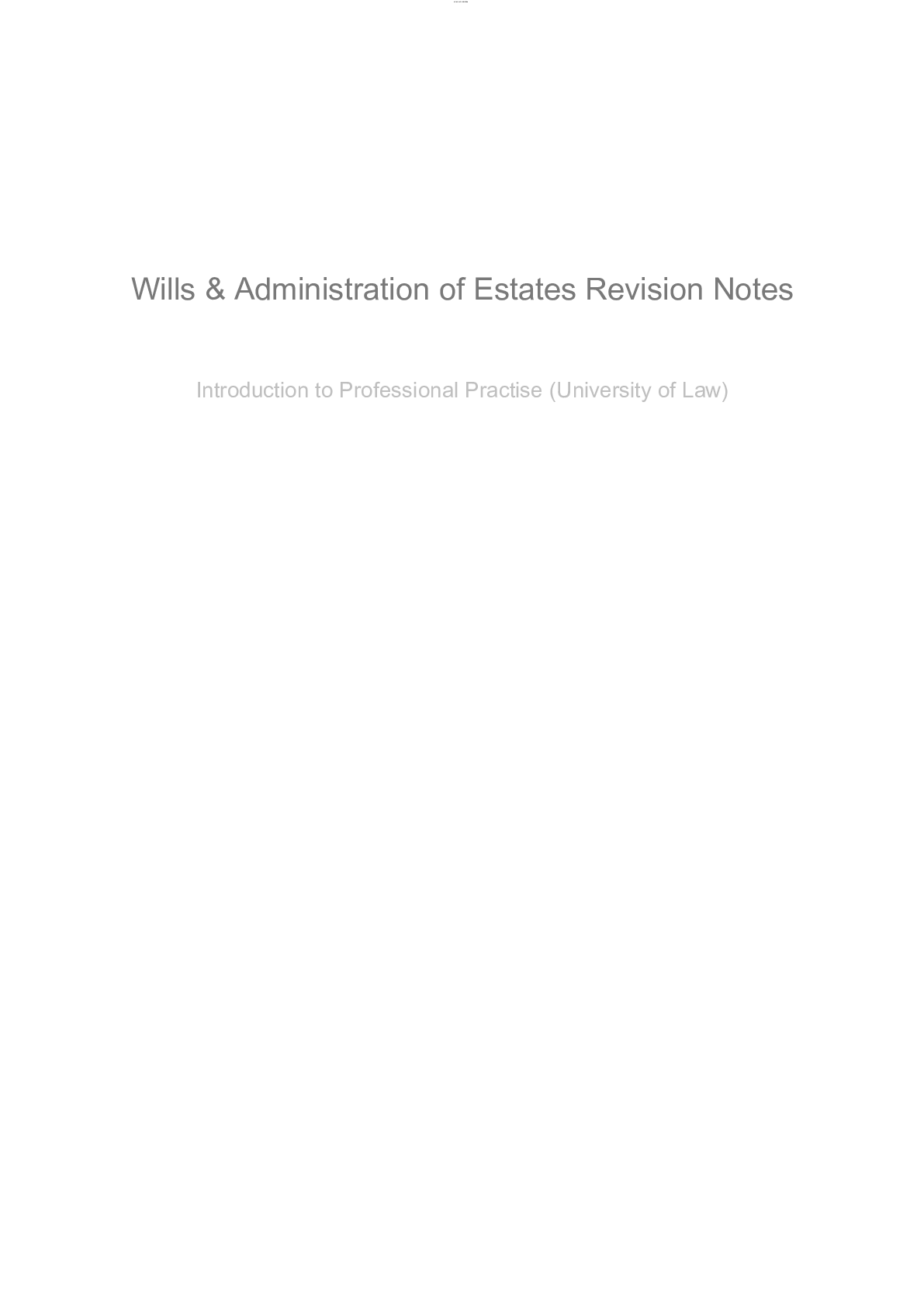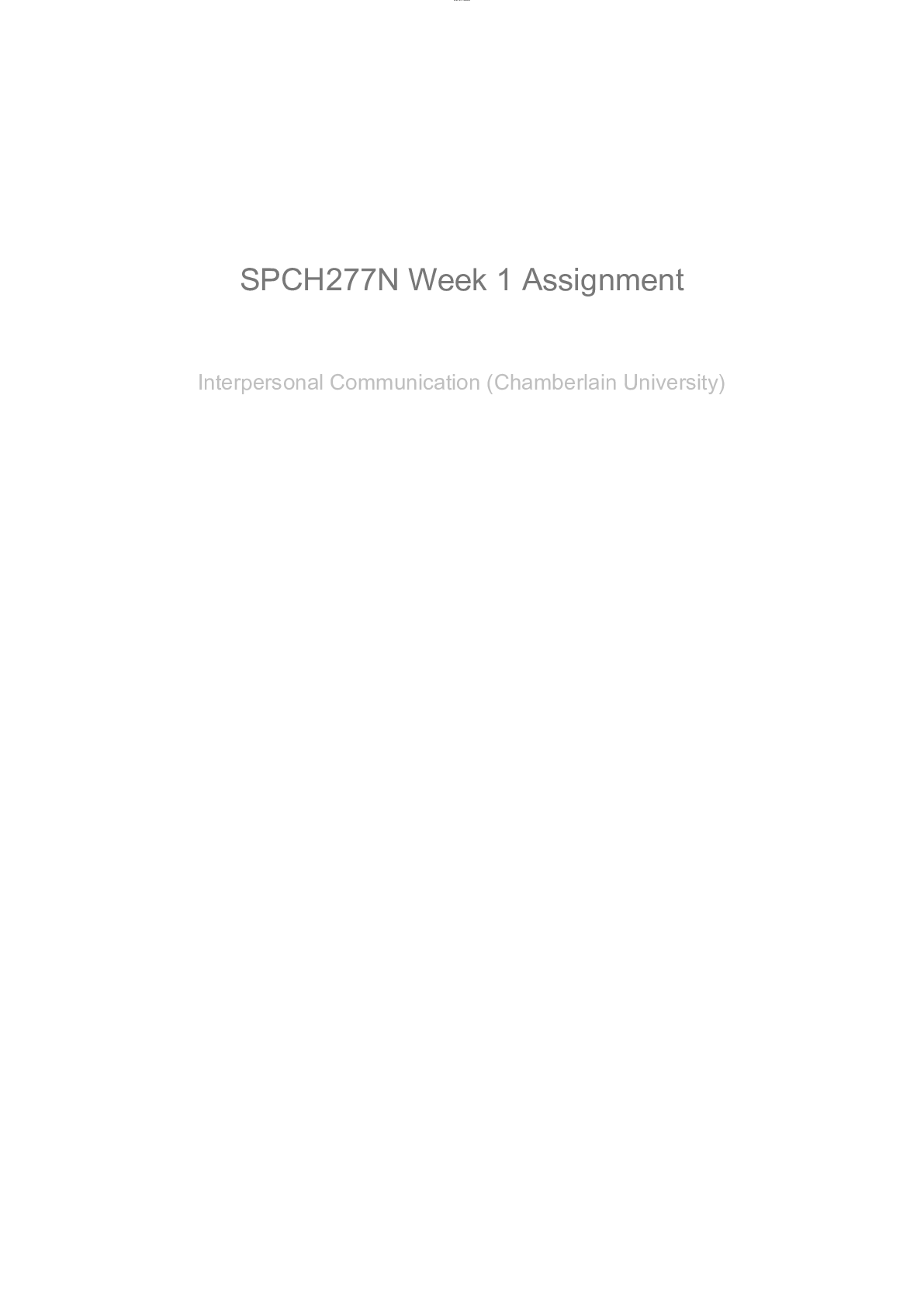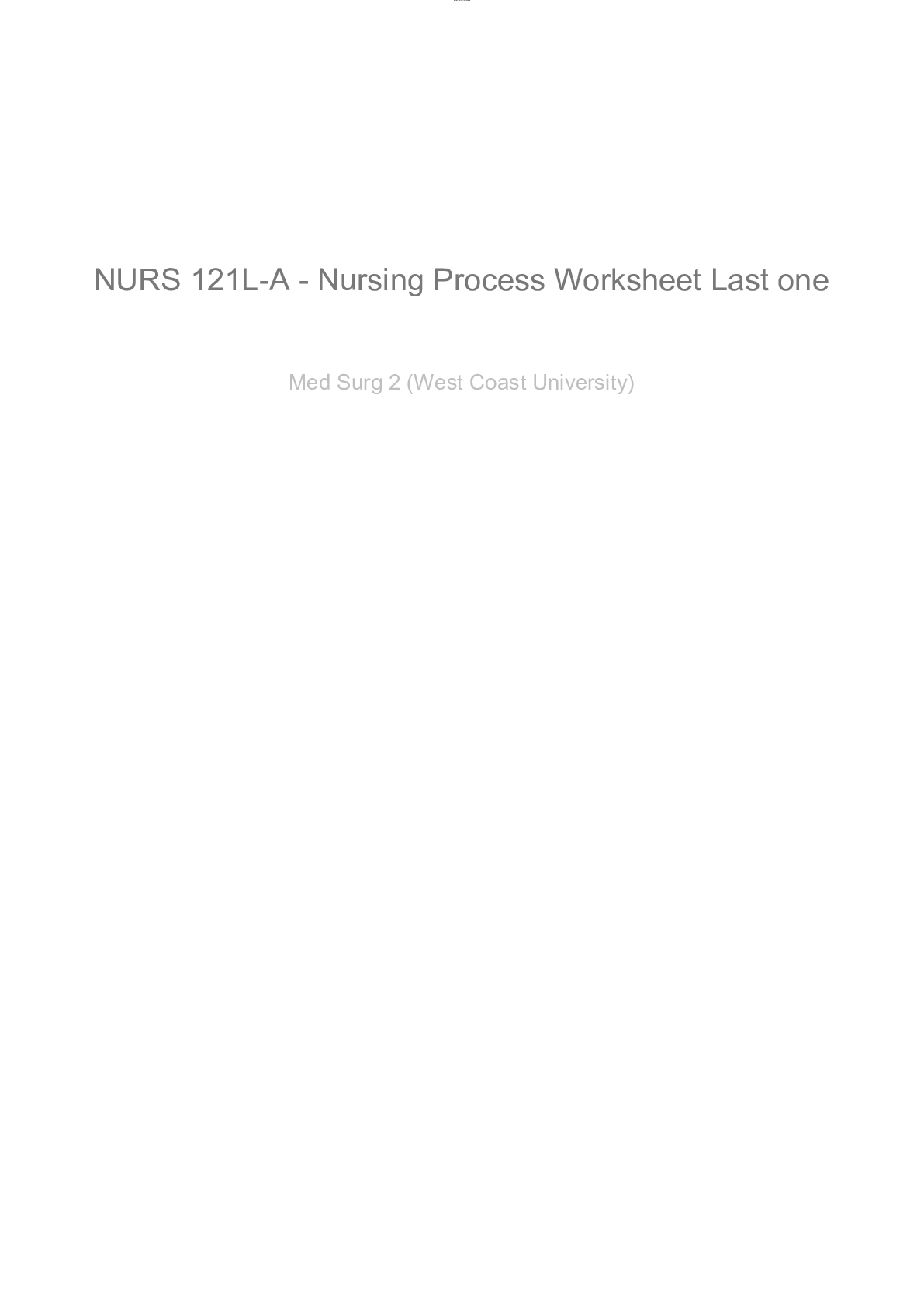Law > Study Notes > Family Law (PVL 2601): FAMILY LAW NOTES -With Multiple Discussion Questions/Scenario and Answers. (1 (All)
Family Law (PVL 2601): FAMILY LAW NOTES -With Multiple Discussion Questions/Scenario and Answers. (167 Pages)
Document Content and Description Below
CONTENTS: FAMILY LAW NOTES Definition Defined as a contract between a man and woman to marry each other on a specific or determinable date. An engagement is not like a normal contract!!! ... A valid engagement is not a prerequisite for the conclusion of a valid Requirements for a valid engagement The four requirements: 1. Consent. 2. Capacity to act. 3. Engagement must be lawful. 4. Possibility of performance. (i) Consent: A material mistake renders an engagement void. A misrepresentation renders an engagement voidable, at the instance of the party who is misled. It does not matter whether the misrepresentation was made innocently or fraudulently. Critical Law Studies cc © CLS cc © Family Law Notes 2 (ii) Capacity to Act If a minor gets engaged, he needs the necessary consent from Both parties must be unmarried. A promise made by a married person to marry after obtaining a divorce is void because it is contra bonos mores (against good morals). (iii) Possibility of performance They must not be under the age of puberty. They must not be related within the prohibited degrees of relationship. Critical Law Studies cc © CLS cc © Family Law Notes 4 The Content and Consequences of Engagement Terms: A valid condition: won’t marry until age 22. Impossible condition: won’t marry until you build me a house on the moon. (engagement is valid but the condition is pro non scripto) Unlawful condition: we will only get engaged if you allow me to have sex with you now. (engagement is valid but the condition is pro non scripto) Condition contrary to marriage: we will get engaged on condition we agree never to have children. (engagement is invalid) Termination of the Engagement Six ways in which an engagement can be terminated. 1. Marriage. 2. Death of either of them. 3. Mutual agreement. 4. Withdrawal of parental consent. 5. Breach of promise. 6. Unilateral justified termination based on sound reasons. Critical Law Studies cc © CLS cc © Family Law Notes 5 1. Sterility. 2. Impotence (becoming impotent). 3. Develop a hereditary disease. 4. Commits a serious crime. Breach of Promise a) Breach of promise. Unlawful termination of engagement. b) Consequence of a breach of promise. The innocent party can withdraw from the engagement. Consequences of Termination Four actions available after termination of the engagement: 1. Action for damages based on the breach. 2. Action for satisfaction based on personality infringement. 3. Action to claim return of engagement gifts. 4. Action of ground of seduction (damages and satisfaction). Critical Law Studies cc © CLS cc © Family Law Notes 6 Action for damages Damages for breach of promise are awarded differently from the way in which they are awarded for other contracts. When ordinary contracts are breached, damages are calculated on the basis of positive interest. Critical Law Studies cc © CLS cc © Family Law Notes 7 GUGGENHEIM V ROSENBAUM – breach of promise to marry – damages In 1943 the plaintiff was divorced at Reno in the American state of Nevada. At that stage she was domiciled in the state of New York. While she resided in New York she met the defendant, who was on a visit to the United State. The defendant domiciled in S.A. They fell in love and in New York the defendant asked the plaintiff to marry him. plaintiffs claim for damages was allowed. Critical Law Studies cc © CLS cc © Family Law Notes 8 Plaintiffs claim for damages was decided as follows: • Loss on sale of motor vehicle – court rejected plaintiffs claim as she could not prove that the vehicle was sold below its market value. • Cost of packing and storing belongings – plaintiff proved these expenses – R187 • Loss of earnings – court found that plaintiff was supported by defendant for a period of time and that she then found employment in JHB and plaintiff could not prove that this income was lower than her previous one. Her claim was therefore rejected. • Loss of apartment – court rejected this claim as she could not prove that she would pay a higher rental for another apartment should she decided to return to New York • Cost of returning to New York – rejected • Prospective loss – the probability would have been that parties would have married anc excluding the community of property and profit and loss. In the absence of proof to the contrary it must be assumed against the plaintiff that no marriage settlement would have been made on her in the anc. Taking into consideration that the defendant is a man of affluence and occupies a position of life that is superior to her own, she would have therefore derived material benefits from their marriage – R2000 was approved. • Delictual damages – R500 awarded. Action for satisfaction based on iniuria For the innocent party to be successful with this action, he must be the motive behind the action, their social status, plaintiff’s age and possibility of plaintiff marrying some else. Case law where the court granted satisfaction for personality infringement based on breach of promise: o Davel v Swanepoel The defendant kept the plaintiff on a string and secretly married a third party without first terminating the engagement o Smit v Jacobs The defendant secretly entered into a marriage with a third party, without Critical Law Studies cc © CLS cc © Family Law Notes 9 first terminating the engagement o Guggenheim v Rosenbaum The defendant, after having concluded an engagement, denied all knowledge of its existence Return of engagement gifts – The rules applicable Sponsalitia largitas - All gifts made with the marriage in view. Arrhae sponsalitiae - Engagement ring and gifts presented to show the seriousness of promise (watch). If the parties agree to terminate the engagement, (a) and (b) must be returned by both parties. Inconsequential gifts (ones to which no specific meaning is attached) or gifts which have been used up or lost, need not be returned. If the engagement has been brought to an end by justa causa, the same rule as above, will apply. If one party has committed a breach of promise: The innocent party can claim back (a) and (b) – which he gave. The innocent party can keep (a) and (b) - which he received. Satisfaction and damages on the ground of seduction a) Seduction is the extra marital intercourse with a virgin with her Because the action for seduction, can only be instituted by a woman, it constitutes inequality before the law and unfairly discriminates against men and therefore violates section 9 of the Constitution. Therefore, the action should be abolished. Critical Law Studies cc © POSSIBLE QUESTIONS CLS cc © Family Law Notes 10 Name four grounds for the termination of an engagement. (1) The couple’s marriage. (2) The death of either of the parties. (3) A mutual agreement to terminate the engagement. (4) Withdrawal of parental consent where one of the parties is a minor. Name the requirements for a valid engagement. The four requirements: 1. Consent. 2. Capacity to act. 3. Engagement must be lawful. 4. Possibility of performance. Discuss the meaning of “iusta causa” and give an example. Critical Law Studies cc © CLS cc © Family Law Notes 11 LEGAL REQUIREMENTS FOR THE CONCLUSION OF A VALID MARRIAGE Critical Law Studies cc © CLS cc © Family Law Notes 18 THE MARRIAGE OF A MINOR 1. Consent necessary for the marriage of a minor a. The parents of the minor b. The Minister of Home Affairs c. The presiding officer of the Children’s Court: d. High Court e. Instances in which the minor requires no consent to marry 2. Effects of the absence of the necessary consent (where 1 or both are minors without consent) a. Effect of validity of the marriage b. Effect on patrimonial consequences of the marriages i. If the marriage is dissolved ii. If the marriage is not dissolved Critical Law Studies cc © CLS cc © Family Law Notes 21 VOID AND VOIDABLE CIVIL MARRIAGES AND PUTATIVE CIVIL MARRIAGES The distinction between void and voidable civil marriages Stuprum (sexual intercourse before marriage) Sterility What is the difference between sterility and impotence? Impotence is the inability to have sexual intercourse. With sterility the party can The meaning of “invariable consequences of marriage” BANNATYNE V BANNATYNE –enforcement of a maintenance order. Critical Law Studies cc © CLS cc © Family Law Notes 32 The objective approach: POSSIBLE QUESTIONS CLS cc © Family Law Notes 36 Answer the following questions regarding void, voidable and putative marriages: How does a void marriage differ from a voidable marriage? Answer this question by stating two differences between a void marriage and a voidable marriage. (In your answer you should not refer to the grounds for a void and a voidable marriage). Which two conflicting opinions exist in our case law regarding sterility as a ground for the voidability of a marriage? In your answer you have to mention the names of the two relevant court cases and indicate which viewpoint each court case represents. What is understood by the term “putative marriage”? Explain Discuss Ex Parte Dow. See above Critical Law Studies cc © CLS cc © Family Law Notes 37 What is meant by the “consortium omnis vitae”? Discuss the objective and subjective approaches regarding the purchase of household necessaries. Or Which two tests are used to determine whether a certain item is a household necessary? Name these two tests and briefly explain what each entails May a spouse’s capacity to purchase household necessaries unilaterally and without a court order be revoked by the other spouse? Briefly explain. Explain what is understood by the term “voidable marriage” and give one example of such a marriage. Critical Law Studies cc © (1) Stuprum (2) Impotence (3) Sterility CLS cc © Family Law Notes 39 Explain what is understood by the term “invariable consequence of a marriage” and give one example of such a consequence. Explain with reference to case law (refer to only one court case) what is understood by the term “consortium omnis vitae”. Piet and Elsie, who are both currently 17 years old, were married on 1 November 2007. Because Piet and Elsie’s parents objected to the marriage and they did not have the money to apply to the high court for consent, they married without the necessary consent. They agreed to be married out of community of property and loss and expressly excluded the accrual system in their antenuptial contract. Piet and Elsie were however recently informed that section 24(2) of the Matrimonial Property Act 88 of 1984 (which regulates the matrimonial property system of a minor’s marriage which is not set aside), does not make provision for the matrimonial property system they selected. Piet and Elsie now approach you for advice on the correct position regarding their matrimonial property system. Fully advise them, with reference to the content of and implications of section 24(2) of the Matrimonial Property Act as well as the various interpretations of this section. You need not refer to the constitutional aspects regarding this issue. Which legal concept is used in our law to determine when a marriage relationship is no longer normal? Give a description of this concept and refer to case law in which the concept was defined. Critical Law Studies cc © CLS cc © Family Law Notes 41 Critical Law Studies cc © CLS cc © Family Law Notes 42 MARRIAGE IN COMMUNITY The nature of universal community of property The husband and wife become co-owners in undivided half-shares of Critical Law Studies cc © CLS cc © Family Law Notes 43 The content of universal community of property Joint Assets Critical Law Studies cc © Assets excluded in an ANC CLS cc © Family Law Notes 44 Assets excluded by will or deed of donation (NB) from the joint estate are protected against attachment for debts. . Assets subject to a fideicommissum or usufruct Jocalia (small gifts) Critical Law Studies cc © CLS cc © Family Law Notes 45 Benefits under the Friendly Societies Act Satisfaction recovered by a spouse Costs in a matrimonial action Assets which replace separate assets Proceeds excluded by the court in terms of the Prevention of Organised Crime Act: Joint liabilities Critical Law Studies cc © CLS cc © Family Law Notes 46 Ante-Nuptial Debts Contractual debts incurred during the marriage (stante matrimonio) Delictual debts incurred (stante matrimonio) Other separate debts incurred stante matrimonio Critical Law Studies cc © CLS cc © Family Law Notes 48 MARRIAGE IN COMMUNITY ADMINISTRATION OF THE JOINT ESTATE Equal Management of the Joint Estate The difference forms of consent 3 Forms of consent: 1. Prior written consent, attested by two competent witnesses Critical Law Studies cc © CLS cc © Family Law Notes 49 2. Written consent, attested by two competent witnesses 3. Written consent without any further requirements 4. Oral or tacit consent Critical Law Studies cc © CLS cc © Family Law Notes 50 Donations Acts for which no consent is necessary Protective measures in the Matrimonial Property Act in respect of the administration of the joint estate Protection of third parties Critical Law Studies cc © CLS cc © Family Law Notes 51 Distiller’s Corp v Modiese: Protection of spouses as between themselves Capacity to litigate Critical Law Studies cc © CLS cc © Family Law Notes 54 MARRIAGE OUT OF COMMUNITY The purpose of the ante-nuptial contract Requirements for the creation of a valid anc Section 88 sets out 3 requirements that must be met before the High Court will grant consent. The contents of the anc Provisions concerning liability of spouses with regard to household necessaries Marriage settlements (donations) Matrimonial property system Exclusion of community of property with retention of community of profit and loss Critical Law Studies cc © CLS cc © Family Law Notes 62 ALTERATION OF THE MATRIMINONIAL SYSTEM The principle of immutability: Court Sanctioned Alteration of the Matrimonial Property System in terms of Section 21 (1) of the Matrimonial Property Act Requirements: 1. . It is not clear whether the courts can authorise an alteration of the matrimonial property system with RETROSPECTIVE effect: Ex Parte Kros – was possible. Ex Parte Oosthuizen – was not possible. Critical Law Studies cc © Extra-judicial alteration of the matrimonial property system Critical Law Studies cc © CLS cc © Family Law Notes 66 Critical Law Studies cc © POSSIBLE QUESTIONS CLS cc © Family Law Notes 67 Mr and Mrs Tinkie are married out of community of property subject to the accrual system. Their antenuptial contract has been registered in the deeds registry. Two years after their wedding they entered into a further contract, which was notarially executed but not registered in the deeds registry, neither was it concluded with leave of the court according to section 21(1) of the Matrimonial Property Act 88 of 1984. According to this second contract the accrual system was excluded from the date of the parties’ wedding. Last year Mrs Tinkie sued Mr Tinkie for a divorce. In her application Mrs Tinkie relied on the postnuptial contract. Discuss critically with reference to the relevant authority, whether this postnuptial contract will be recognised by the court. Mr and Mrs Kassim are married in community of property. Their joint estate is currently worth R50 000. Mr Kassim has private assets to the value of R10 000, while Mrs Kassim’s private assets are worth only R6 000. During a cricket match their son participated in over the weekend, Mrs Kassim insulted the referee, Mr Grump. Mr Grump, who is also married in community of property, now sues Mrs Kassim for R10 000 satisfaction for the insulting remarks she made against him. Critical Law Studies cc © CLS cc © Family Law Notes 68 What form of consent does a person who is married in community of property require from his or her spouse to institute legal proceedings against another or defend legal proceedings instituted by another person? Does this general rule regarding the capacity to litigate of spouses married in community of property apply to Mrs Kassim and Mr Grump? Explain fully, with reference to authority, from which assets the R10 000 satisfaction (for which Mrs Kassim is being sued) should be paid. Mr and Mrs Seaman got married in community of property in 1993. A week ago Mrs Seaman donated a priceless art collection, which formed part of the spouses’ joint estate, to her friend, Mrs Doubell. Owing to the fact that Mrs Seaman knew that Mr Seaman would never have consented to the alienation of the art collection, the transaction between Mrs Seaman and Mrs Doubell took place without Mr Seaman’s knowledge. The art collection was bought by the spouses as an investment. Did Mrs Seaman act lawfully in terms of the provisions of section 15 of the Matrimonial Property Act 88 of 1984? Is the transaction between Mrs Seaman and Mrs Doubell valid? Explain your answer with reference to legislation and relevant case law Mr Seaman wants to divorce Mrs Seaman and invoke the remedy provided for in section 15(9)(b) of the Matrimonial Property Act Critical Law Studies cc © CLS cc © Family Law Notes 70 88 of 1984. What does this remedy entail and which two requirements must be met should Mr Seaman rely on it? Mr and Mrs Haigh were married in community of property. A month ago Mrs Haigh donated a valuable stamp collection, which formed part of the spouses’ joint estate, to her sister, Mrs Stow. The transaction between Mrs Haigh and Mrs Stow took place without Mr Haigh’s Knowledge. The stamp collection was originally bought by the spouses as an investment. Answer the following questions: Did Mrs Haigh act lawfully in terms of the provisions of section 15 of the Matrimonial Property Act 88 of 1984? Is the transaction between Mrs Haigh and Mrs Stow valid? Explain your answer with reference to legislation and relevant case law The fundamental idea underlying the accrual system is that the spouses who are married in terms of this system must share in what they amassed together during the subsistence of their marriage. Certain assets, however, are excluded from the accrual, which means that the value of these assets is not taken in account when the accrual is determined. Name the assets referred to here. A few years ago Mr and Mrs Fender married out of community of property with application of the accrual system. Mr Fender is a extreme gambler. He spends most of his income on his gambling and has also built up large gambling debts. In an effort to pay his gambling debts he starts selling his assets without consulting Mrs Fender. Mrs Fender has no assets of her own. When she discovers that assets are disappearing from the matrimonial home she confronts Mr Fender. Mr Fender tells Mrs Fender that it is none of her business what he does with his own assets. Fully discuss the statutory remedy which is available to Mrs Fender under these circumstances Mr and Mrs Norel were married in community of property. Each of them possessed certain assets before they were married. Indicate which of the assets mentioned below form part of their joint estate by simply answering “yes” or “no”. Mrs Norel bought a house before she was married. Does the house fall in the joint estate? Mr Norel was awarded non-patrimonial damages in a delictual action. Does the award for non-patrimonial damages fall in the joint estate? Does Mr Norel’s wedding ring fall in the joint estate? Mr Norel inherited a house from his father that is still subject to a usufruct in favour of his mother. Does the house fall in the joint estate? Mrs Norel inherited an amount of R31 000 from her mother. The will stipulated that the money should fall outside the joint estate. There were no further stipulations in the will. She invested the money at an interest rate of 9, 5% per annum. Does the interest form part of the joint estate? Mr and Mrs Waren, who live in a gorgeous manor situated on a very great estate in Muzenburg, were married in community of Critical Law Studies cc © CLS cc © Family Law Notes 73 property on 18 March 1988. The land and house fall within Mr and Mrs Warren’s joint estate. Indicate which form of consent Mr Warren requires from Mrs Warren for each of the following transactions in terms of section 15 of the Matrimonial Property Act 88 of 1984: Mr Warren decides to subdivide the property and alienate the subdivided section of the property. Which form of consent does he require from Mrs Warren? Mr Po bought the subdivided property from Mr Warren. The only way in which Mr Po can reach the street from his property is via Mr and Mrs Warren’s property. Mr Warren intends to conclude a contract with Mr Po in terms of which a servitude will be registered over their property in favour of Po. Which form of consent does Mr Ward require from Mrs Ward to conclude the contract with Mr McBride? Indicate which form of consent Mr Warren requires from Mrs Warren for the actual registration of the servitude (in (b)) in the deeds office. Which remedy may Mr Warren use against Mrs Warren if she unreasonably withholds her consent with regard to the conclusion of the contracts in (a), (b) and (c)? Mr and Mrs Nike entered into an antenuptial contract prior to their marriage. Now, a year after their marriage, they discovered that their attorney did not comply with the formalities of notarial execution and registration of the contract. They approach you for advice. Advise them fully, with reference to the relevant legislation, on what they can do to rectify this. Mr and Mrs Massey were married out of community of property in 1988. They did not expressly exclude the accrual system in their antenuptial contract. Neither Mr nor Mrs Massey had any assets at the time of the conclusion of their marriage. Mr Massey died last week. Mr Massey’s net estate at the time of his death is valued at R100 000 and includes inter alia the following: • R10 000 which he inherited intestate from his father. • R15 000 which he received as compensation for the loss of income he sustained while he was in hospital after an accident. • R20 000 which he received as compensation for the damages caused to his motor vehicle during the accident. • R55 000 which he earned on his own as a doctor. Mrs Massey’s net estate at the time of Mr Massey’s death is valued at R30 000 and includes inter alia the following: • A coin worth R2 000 which she excluded from the accrual in the antenuptial contract. • R8 000 which she inherited intestate from her father. Indicate by doing the necessary calculations whether Mrs Massey has an accrual claim against Mr Massey’s estate. Discuss your answer by substantiating your calculations. Mr and Mrs Noble got married out of community of property on 26 January 2002. They did not expressly exclude the accrual system from their marriage. At the time of the conclusion of the marriage Mr Noble’s liabilities exceeded his assets while Mrs Noble had R5 000 in cash. Mr Noble died last week. Mr Noble’s net estate at the time of his death is worth R50 000 and consists of the following: • R15 000 which he received as satisfaction for pain and suffering after being involved in a motor vehicle accident • R12 000 which he received as compensation for damages caused to his motor vehicle during the accident • A computer to the value of R5 000 which he received as a gift from his mother • R18 000 which he earned on his own Mrs Noble’s net estate at the time of Mr Noble’s death is worth R30 000 and includes, inter alia, the following: • R6 000 which she inherited intestate from her father • A ring of the value of R4 000 which she received as a gift from Mr Noble during the subsistence of the marriage Suppose that during the subsistence of the marriage, money has depreciated to such an extent that, in terms of the consumer price index, R2, 00 now has the same value as R1, 00 had at the beginning of the marriage. Indicate, by doing the necessary calculations, whether Mrs Noble has any claim against Mr Noble’s estate. Discuss your answer by substantiating your calculations. Mr and Mrs Kite got married out of community of property on 1 February 2002. They did not expressly exclude the accrual system from their marriage. At the time of the conclusion of the marriage Mr Kite’s liabilities exceeded his assets while Mrs Kite had R5 000 in cash. Mr Kite died last week. Mr Kite’s net estate at the time of his death is worth R50 000 and consists of the following: • A laptop worth R5000 from his father • R15 000 which he received as satisfaction for pain and suffering after being involved in a motor vehicle accident Critical Law Studies cc © CLS cc © Family Law Notes 77 • R12 000 which he received as compensation for damages caused to his motor vehicle during the accident • A computer to the value of R5 000 which he received as a gift from his father • R18 000 which he earned on his own as an electrician Mrs Kite’s net estate at the time of Mr Kite’s death is worth R30 000 and includes, inter alia, the following: • R6 000 which she inherited intestate from her gran • A coin of the value of R4 000 which she received as a gift from Mr Kite during the subsistence of the marriage Suppose that during the subsistence of the marriage, money has depreciated to such an extent that, in terms of the consumer price index, R2, 00 now has the same value as R1, 00 had at the beginning of the marriage. Indicate, by doing the necessary calculations, whether Mrs Kite has any claim against Mr Kite’s estate. Discuss your answer by substantiating your calculations. Critical Law Studies cc © CLS cc © Family Law Notes 79 DISSOLUTION OF A MARRIAGE DISSOULTION BY DEATH Of EITHER OR BOTH SPOUSES Marriages in community of property Marriage out of community of property Maintenance of Surviving Spouses Act 27 of 1990 The position of surviving customary, Muslim and Hindu marriages The position of surviving life partners Critical Law Studies cc © DIVORCE GROUNDS FOR DIVORCE CLS cc © Family Law Notes 83 The Grounds for Divorce Irretrievable Breakdown of the marriage as a ground for divorce – Section 4 A purely objective approach means: Critical Law Studies cc © CLS cc © Family Law Notes 84 A purely subjective approach means: The guidelines in Section 4 (2) Divorce on the ground of mental illness or continuous unconsciousness – Section 5 The circumstances which the plaintiff must prove in order to obtain a divorce on the ground of the defendant’s continuous unconsciousness, are set out in Section 5 (2) as: The connection between Section 4 and Section 5 Critical Law Studies cc © CLS cc © Family Law Notes 86 Does the court have a discretion to grant or refuse a decree of The court has discretion to refuse a decree of divorce: Critical Law Studies cc © CLS cc © Family Law Notes 88 CONSEQUENCES OF DIVORCE The Patrimony of the Spouses Pension interests NB!!! THE PENSION FUNDS AMENDMENT ACT 11 OF 2007 AND THE FINANCIAL SERVICES LAWS GENERAL AMENDMENT ACT 22 of 2008 The meaning and calculation of “pension interest” The difference between a pension interest and a pension benefit: Hahlo: Sinclair and Kaganas: Persad, Toho, Moremi and Koza d Critical Law Studies cc © CLS cc © Family Law Notes 95 SECTION 7(3) – (6): REDISTRIBUTION OF ASSETS Critical Law Studies cc © CLS cc © Family Law Notes 104 Difference between forfeiture and redistribution Critical Law Studies cc © CLS cc © Family Law Notes 105 SECTION 7(1) – (2): MAINTENANCE CLS cc © Family Law Notes 106 Lump sum maintenance: today courts can award lump sum maintenance. This is according to court decisions and the new Token maintenance: this is asked for at the divorce hearing, because Rescission, suspension and variation of the order: Critical Law Studies cc © POSSIBLE QUESTIONS CLS cc © Family Law Notes 109 Is the Maintenance of Surviving Spouses Act 27 of 1990 applicable to Muslim marriages?. In 1996 Mr and Mrs Lulli were married in South Africa out of community of property with application of the accrual system, after they had met each other abroad at a legal conference. Before the marriage Mrs Lulli practiced as an attorney in Italy. However, since the marriage she has not worked again because her legal qualifications are not recognised in South Africa. Mr Lulli has been a public prosecutor for the past 17 years. He earns a good salary and is also a member of the government’s retirement fund. Although Mr Lulli works full-time, he is just as actively involved in the daily life of their sons, who were born of the marriage, as Mrs Lulli. Mr and Mrs Lulli were happily married until a month ago, when Mr Lulli acknowledged that he was actually homosexual, and moved in with his friend, Mr Ling. Shortly thereafter Mr Lulli sued Mrs Lulli for a divorce, as he wished to get married to Mr Ling as soon as possible. In the summons he offers to pay an amount of money to Mrs Lulli in settlement of her accrual claim and requests joint physical custody of their sons. Mrs Lulli opposes the divorce. She denies that the marriage has broken down irretrievably and feels that Mr Lulli should get his life in order and return to her and the boys. In the event that Mr Lulli is not prepared to do so, she claims that Critical Law Studies cc © CLS cc © Family Law Notes 110 the amount of money that he offers her should be increased, as it is clear that his pension interest was not considered in the calculation of this amount. She also claims that custody of the boys should be awarded to her, since she wishes to return with the boys to Italy, where she can practice as an attorney again and enjoy the support of her family. Which legal concept is used in our law to determine when a marriage relationship is no longer normal? Also give a description of this concept and refer to a case in which the concept was described. Can Mrs Lulli claim that Mr Lulli’s pension interest must be considered in the calculation of her accrual claim? Explain your answer with reference to the relevant legislation and case law. Mr and Mrs Smith got married out of community of property in 2005. During the first four years of marriage, the couple was extremely happy. As a emblem of his love for her, Mr Smith donated a luxurious porsche to Mrs Smith on their fourth wedding anniversary. Nothing is mentioned about this donation in the spouses’ antenuptial contract. On 31 March 2011 Mrs Smith informed Mr Smith she was involved in an intimate relationship with her gym instructor, Mr Miles, and that she wanted to divorce Mr Smith. After that, the spouses no longer shared a bedroom and although they still shared the same house, they rarely communicated. In September 2011, Mrs Smith ended their relationship with Mr Miles in order to reunite with Mr Smith. Although they were happy for the first 5 months, Mrs Smith realised that reconciliation between herself and Mr Smith was impossible and that she wanted to spend the rest of her life with Mr Miles. Since January 2012 Mrs Smith has been living Critical Law Studies cc © CLS cc © Family Law Notes 112 with Mr Miles. She plans to sue Mr Smith for a divorce at the end of March 2012. Mrs Smith has been informed that she can sue Mr Smith for a divorce on the ground of irretrievable breakdown of the marriage. When is a marriage considered to have been irretrievably broken down? Name the criteria laid down by section 4(1) of the Divorce Act 70 of 1979 in this regard. The first guideline in section 4(2) of the Divorce Act 70 of 1979, which may indicate that a marriage has broken down irretrievably, is that the parties have not lived together as husband or wife for a continuous period of at least one year immediately prior to the date of the institution of the divorce action. Which two aspects does Mrs Smith need to prove to the court, if she wishes to rely on this guideline only? Why would Mrs Smith not be able to rely on this guideline? Would Mr and Mrs Smith be able to get a divorce if the court adopted the approach in Coetzee v Coetzee? Answer “Yes” or “No” and explain your answer by indicating what was decided in Coetzee v Coetzee regarding irretrievable breakdown as a ground for divorce Mr Smith informed Mrs Smith that he intends to oppose the divorce action and request a forfeiture order in terms of section 9 Critical Law Studies cc © CLS cc © Family Law Notes 113 of the Divorce Act 70 of 1979. Mrs Smith wishes to know from you whether the car which Mr Smith donated to her will be regarded as a patrimonial benefit of the marriage that may be forfeited by her upon divorce. Fully advise her with reference to authority and the opinions of legal writers. What does a redistribution order entail? Explain very briefly. May the court grant a redistribution order if the spouses were married in community of property? One of the requirements for granting of a redistribution order is that the spouse who requests it should have contributed directly or indirectly during the subsistence of the marriage to the maintenance or increase of the estate of the other spouse. List the ways in which one spouse can, in terms of section 7(4) of the Divorce Act 70 of 1979, contribute to the maintenance or increase of the other spouse’s estate Briefly explain the meaning of the “clean break” principle. Also explain whether it is applied in our law. What is “nominal maintenance” and why is it granted? Briefly explain the meaning of “rehabilitative maintenance”. Name the factors that should be taken into account in considering the surviving spouse’s reasonable maintenance needs. Distinguish between a redistribution order in terms of section 7(3)-(6) of the Divorce Act and a forfeiture order in terms of section 9 of the Divorce Act by briefly explaining what each entails. Mrs Rees plans to ask the court to grant a redistribution order in her favour in terms of section 7(3)-(6) of the Divorce Act 70 of 1979. Have the prerequisites for the granting of a redistribution order been met in this case? Briefly motivate your answer. Critical Law Studies cc © CLS cc © Family Law Notes 116 Distinguish between “lump sum maintenance” and “token maintenance”. How does a maintenance order terminate? Explain what is meant by a “dum custa” clause. Mr and Mrs Boussoni, both Asians, got married on 10 June 1980 in terms of the old standard-form antenuptial contract. Mrs Boussoni, a secretary, never possessed any valuable assets. In 1985, Mrs Boussoni was offered a post as a secretary at a lawyer’s office in Bloem. She declined this offer in order to further her husband’s career as a doctor in Lenasia, where they lived. Mr Boussoni contributed towards Mrs Boussoni’s maintenance until Critical Law Studies cc © CLS cc © Family Law Notes 117 she recently left him because their marriage had broken down irretrievably. Although Mr Boussoni had no assets at the time of entering into marriage, his estate is today worth R600 000. Mrs Boussoni, however, still does not possess any valuable assets. Mrs Boussoni now sues Mr Boussoni for a divorce. Owing to the fact that the spouses can reach no agreement on the division of their assets, Mrs Boussoni also requests a redistribution order as contemplated in sections 7(3)-(6) of the Divorce Act 70 of 1979. One of the requirements for granting of a redistribution order is that the spouse who requests it should have contributed directly or indirectly during the subsistence of the marriage to the maintenance or increase of the estate of the other spouse. State the ways in which one spouse can, in terms of section 7(4) of the Divorce Act 70 1979, contribute to the maintenance or increase of the other spouse’s estate. Does Mrs Boussoni’s behaviour, that is, declining the offer to work in Bloem in order to further Mr Boussoni’s career in Lenasia, qualify as a contribution? Answer “Yes” or “No” and substantiate your answer with reference to relevant case law. Suppose Mrs Boussoni did not work at all during the subsistence of the marriage but took care of their disabled child and managed the household. Explain, with reference to the opinion of Sonnekus and relevant case law, whether her contribution as a housewife qualifies as a contribution. Mr and Mrs Bothma married out of community of property in 2000. In 2003 Mr Bothma bought a Mercedes for Mrs Botha as a gift. The spouses’ antenuptial contract makes no mention of this donation. Mr Bothma sued Mrs Bothma for divorce last week when he discovered that she has been having an affair with the pool boy, Pablo. Mr Bothma also requested a forfeiture order in terms of section 9 of the Divorce Act 70 of 1979 against Mrs Bothma. Name the three factors contained in section 9(1) of the Divorce Act that a court has to take into account when making a forfeiture order. Fully discuss, with reference to case law and the opinions of legal authors, whether the jeep (which Mrs Bothma received as a gift from Mr Bothma during the subsistence of their marriage) will be regarded as a patrimonial benefit of the marriage which Mrs Bothma may have to forfeit upon divorce. Critical Law Studies cc © Mr and Mrs Berman concluded a marriage in accordance with the Jewish faith, in addition to a South African civil marriage. Mrs Berman, who for the past three years has been having an affair with her gynaecologist, Dr Jacobs, sued Mr Berman for divorce. She wishes to marry Dr Jacobs as soon as possible because she is expecting his baby. Mr Berman, however, informed Mrs Berman that he would never grant her a Jewish religious divorce (a get). Answer the following questions: How does the South African divorce address the dilemma Mrs Berman faces, namely that Mr Berman refuses to grant her a get? Answer this question with reference to section 5A of the Divorce Act 70 of 1979. State the name of the first reported case which dealt with Section 5A of the Divorce Act 70 of 1979 and briefly indicate what was decided in that case. Amar v Amar. Critical Law Studies cc © It has been argued that section 5A of the Divorce Act 70 of 1979 violates the constitutional right to equality because it treats spouses in religious marriages differently from spouses whose marriages are not governed by a system of religious law. In what way does section 5A of the Divorce Act 70 of 1979 treat spouses in religious marriages differently from spouses whose marriages are not governed by a system of religious law? Explain briefly. Is the so-called one-third “rule” part of our law? Explain with reference to case law. Mr and Mrs Wilson were married in June 1984 in terms of the old standard form antenuptial contract. At no stage did they make the accrual system applicable to their marriage. Since they were married, Mrs Wilson was a housewife managing the household and raising the couple’s two children (a 9-year-old disabled daughter, Darlene, and a 17-year-old boy, Koos). Mr and Mrs Wilson now Critical Law Studies cc © CLS cc © Family Law Notes 121 wish to get divorced and agree that Mrs Wilson will have custody of Darlene and Mr Wilson custody of Koos, but that they will exercise joint guardianship over both children. Mrs Wilson plans to immigrate with Darlene to Canada once the divorce has been finalised, since there is a greater access to schools for disabled children there. The spouses, however, cannot reach consensus on the division of their assets. Mrs Wilson has a BCOMPT degree, but foresees that it would be difficult to find a job since she has no working experience. Although Mr Wilson had no assets at the time of entering into marriage, he is currently a wealthy property developer who also inherited a dairy from his father in 1989, and from which he accumulates profit to this day. Owing to her numerous obligations towards her children and the household, Mrs Wilson seldom visited the dairy and had no interest in the dairy activities. Because Mrs Wilson has never earned her own income and has always been financially dependent on Mr Wilson, she has no assets at present. She wishes to request the court to grant a redistribution order in terms of section 7(3)-(6) of the Divorce Act 70 of 1979 in her favour. State the prerequisites for the granting of a redistribution order and indicate whether they are met in this case. One of the requirements for granting a redistribution order is that the spouse who requests it should have contributed directly or indirectly to the maintenance or increase of the other spouse’s estate during the subsistence of the marriage. Does Mrs Wilson meet the requirement? Answer “Yes” or “No” and substantiate your answer with reference to one court decision. (You need to give the name of the court case and briefly state the decision). Explain whether the farm which Mr Wilson inherited would be taken into account by the court in terms of section 7(5) (d) of the Divorce Act 70 of 1979 for purposes of the redistribution order Mrs Wilson realises that because of her qualifications she will not be entitled to permanent maintenance. However, she wishes to know from you whether she will be entitled to any other form of maintenance. Fully advise her with reference to authority. What type of information regarding Mr and Mrs Kyle’s divorce action may be published? Answer this question with reference to Critical Law Studies cc © CLS cc © Family Law Notes 124 the limitation imposed by section 12 of the Divorce Act 70 of 1979 on the publication of particulars of divorce actions. You should also mention when the limitation does not apply Critical Law Studies cc © CLS cc © Family Law Notes 125 CONSEQUENCES OF DIVORCE ON THE CHILDREN INTERESTS OF THE CHILDREN OF DIVORCING PARENTS Critical Law Studies cc © GUARDIANSHIP: CLS cc © Family Law Notes 128 KRUGEL V KRUGEL –joint custody (now care). Critical Law Studies cc © CLS cc © Family Law Notes 131 OTHER FORMS OF UNIONS Customary marriages Muslim and Hindu marriages: HASSAM: Heterosexual and same-sex life partnerships: Critical Law Studies cc © CLS cc © Family Law Notes 134 A civil union Critical Law Studies cc © CLS cc © Family Law Notes 137 CHILDREN’S RIGHTS AND PARENTS’ RESPONSIBILITIES AND RIGHTS Critical Law Studies cc © CLS cc © Family Law Notes 138 Parental responsibilities and rights: S28.Termination, extension, suspension or restriction of parental responsibilities and rights Ways of acquiring parental responsibilities and rights: Critical Law Studies cc © DUTY OF SUPPORT CLS cc © Family Law Notes 142 Other parties duty of support The concept of the duty Termination of the duty Critical Law Studies cc © POSSIBLE QUESTIONS CLS cc © Family Law Notes 144 Name the three requirements for a valid customary marriage. Will the delivery of lobolo continue under the Recognition of Customary marriages Act 120 of 1998? Briefly discuss the duty of support. Critical Law Studies cc © CLS cc © Family Law Notes 145 Name the ways of acquiring parental responsibilities and rights. The Children’s Act 38 of 2005 repeals the Natural Fathers of Children Born out of Wedlock Act 86 of 1997. When does an unmarried father obtain parental responsibilities and rights in terms of the Children’s Act? Vuyo has customary wives, Thandi and Bongi, whom he married in 1997 and 1999 respectively. Thandi is Vuyo’s chief wife at customary law. Bongi refuses to give any recognition to Thandi’s superior status. She argues that since the Recognition of Customary Marriages Act 120 of 1998 came into operation, she and Thandi have equal status. She also informed Vuyo that in terms of this new legislation she is no longer subject to his authority. Vuyo wishes to know from you how the Recognition of Customary Marriages Act changed the status of a wife in a customary marriage. Advise Vuyo by explaining to him what the Act provides regarding the wife’s status and how it has changed the status of multiple wives of one man. Mrs Rees wants to marry Ms Champ after her divorce. She was however informed that the Civil Union Act 17 of 2006 only provides for civil partnerships which do not have the same consequences as a marriage in terms of the Marriage Act 25 of 1961. Is this statement true? Briefly explain your answer with reference to the contents of the Civil Union Act. Which important constitutional value is relevant with regard to both the issue of the recognition of customary marriages and the issue of the recognition of Muslim marriages? Critical Law Studies cc © CLS cc © Family Law Notes 147 Which practices regarding customary marriages are said to infringe the constitutional value intended in Question 7(a)? Explain briefly. Briefly explain whether the infringement of the constitutional value intended in Question 7(a) can be justified in terms of section 36 of the Constitution of the Republic of South Africa. Is a man who is a party to a customary marriage, entitled to enter into a civil marriage at a later stage? Answer this question with reference to authority. Name 4 types of care orders After nine years of marriage Mr Natt informed his wife that he was homosexual and wished to get divorced. He also told her that as soon as their divorce was finalised, he intended to move in with his friend whom he had been having intimate relationship for the past year. Mr and Mrs Natt agreed that Mrs Natt would get custody of their three minor children. Mrs Natt also agreed that Mr Natt could have contact with the children on condition that they should not be exposed to their father’s homosexual relationship. During the divorce proceedings Mrs Natt insists that Mr Natt’s access rights be restricted. She wants the court to make it clear that, when the children visit him or sleep over at his place, Mr Natt’s friend should not be present. Critical Law Studies cc © CLS cc © Family Law Notes 148 In Van Rooyen v Van Rooyen, a decision filled with judgemental remarks about the abnormality and unacceptability of homosexual relationships, the court made a restrictive order similar to that requested by Mrs Natt. Do you think that the court would, in Mr and Mrs Natt’s case, follow the same approach as in Van Rooyen and make a similar order? Substantiate your answer with reference to authority. In 1983 Mr and Mrs Rees were married out of community of property and community of profit and loss (without the accrual system). Mrs Rees supported Mr Rees by selling vitamins and health bars while he got his business off the ground. He is currently a wealthy businessman. They have four minor children. Mr Rees wants to divorce Mrs Rees because he has discovered that Mrs Rees is having an affair with his aerobics instructor, Ms Champ. Mr Rees, who wants custody of the children, heard that the courts prefer mothers as custodians, as it is simply assumed that they make better caretakers. Explain with reference to case law and Cronjé’s constitutional arguments, whether this maternal preference is still, or ought to be, applied by our courts. Critical Law Studies cc © Briefly explain the duties of the family advocate and indicate with reference to case law when the family advocate ought to apply to the court to be appointed. Critical Law Studies cc © CLS cc © Family Law Notes 151 GUARDIANSHIP AND CURATORSHIP Guardianship Critical Law Studies cc © Curatorship: CLS cc © Family Law Notes 152 Critical Law Studies cc © POSSIBLE QUESTIONS CLS cc © Family Law Notes 153 Briefly explain the meaning of the following terms: Tutor dative Curator ad litem Briefly explain what is understood by the term “curatorship”. Critical Law Studies cc © CLS cc © Family Law Notes 154 NOTE THE FOLLOWING CASES AND THEIR IMPORTANT ELEMENTS CASE FACTS / APPLICABLE TO Guggenheim vs Rosenbaum FA:- Termination of Engagement , Consequences of termination of engagement Fourie vs Minister of Home Affairs F:- A:- Lawfulness of persons of the same-sex to marry Ex Parte Dow F A:- Prescribed marriage formalities (during ceremony) Critical Law Studies cc © CLS cc © Family Law Notes 155 Moola vs Aulsebrook F:- A:- Requirements for a putative marriage Solomons vs Abrahams F:- A:- Requirements for a putative marriage Grobbelaar vs Havenga F:- A:- Consortium omnis vitae Peter vs Minister of Law & Order F:- A:- Consortium omnis vitae Critical Law Studies cc © CLS cc © Family Law Notes 156 Excell vs Douglas A:- Household necessaries – Termination of joint household Reloomel vs Ramsay FA:- Household necessaries – How its determined whether something is a household necessary Critical Law Studies cc © CLS cc © Family Law Notes 157 Bannatyne vs Bannatyne FA:- The Maintenance Act 99 of 1998 (enforcement of maintenance orders) Du Plesiss vs Pienaar F:- A:- Marriage in com. Of prop. – Attachment of separate assets Nedbank vs van Zyl F:- A:- Marriage in comm. of prop – Liabilities Reeder vs Softline F A:- When & how accrual takes place – Distinction between claim & right Critical Law Studies cc © CLS cc © Family Law Notes 158 Schwartz vs Schwartz F:- A:- Irretrievable breakdown of the marriage as ground for divorce – test to determine if the consortium has been terminated / violated Swart vs Swart F:- A:- Irretrievable breakdown of the marriage as ground for divorce – test to determine if the consortium has been terminated / violated Smit vs Smit F A:- Does court have discretion to refuse a decree of divorce Critical Law Studies cc © CLS cc © Family Law Notes 159 Wijker vs Wijker FA:- Forfeiture of patrimonial benefit Justness & fairness is no reason to deviate from matrimonial property system Watt vs Watt F:- A:- Benefits which can be forfeited Beaumont vs Beaumont 1. F:- A:- Redistribution of assets – Nature of contribution to the maintenance / increase of other spouse’s estate – Ordinary Duties of a housewife contribution 2. F:- A:- Redistribution of assets – Other considerations court takes into account - Misconduct A:- Redistribution of assets – Criterion for est the extent of the redistribution Critical Law Studies cc © CLS cc © Family Law Notes 160 Kritzinger vs Kritzinger F A:- Redistribution of assets – Nature of contribution to the maintenance / increase of other spouse’s estate – Contribution is a positive act Katz vs Katz F A:- Redistribution of assets – Nature of contribution to the maintenance / increase of other spouse’s estate – Contribution need not be of monetary nature Kroon vs Kroon F:- . A:- Maintenance of spouses – the move away from permanent maintenance Pommerel vs Pommerel F:- A:- Maintenance of spouses – the move away from permanent maintenance McCall vs McCall A:- Interests of children of divorcing parents – Criterion of “the best interests in the child” Critical Law Studies cc © CLS cc © Family Law Notes 161 Van Vuuren vs van Vuuren FA:- Statutory protection of the child’s interest – The Mediation in Certain Divorce Matters Act 24 of 1987 Krugel vs Krugel F:- A:- Aspects regarding the position of the children the court may regulate – Joint custody Daniels vs Campbell A:- Muslim Marriages – Statutory recognition Critical Law Studies cc © CLS cc © Family Law Notes 162 NOTE THESE CLAUSES REFERRING TO SPECIFIC CASES Levy v Levy Sempapalele v Sempapalele Amar v Amar Coetzee v Coetzee Maharaj v Maharaj Ex parte Krös Honey v Honey Ex parte Oosthuizen Critical Law Studies cc © CLS cc © Family Law Notes 163 Ex parte Engelbrecht et Uxor Ex parte Burger Kroon v Kroon Havenga v Havenga Hodges v Couborough Critical Law Studies cc © CLS cc © Family Law Notes 164 COURTS CASES FOR REFERENCE: 1. Van der linder v van der linde – 2. Levy v Levy – 3. Sempalele v Sempalele – 4. Amar v Amar –. 5. Coetzee v Coetzee – 6. Maharaj v Maharaj – 7. Persad v Persad, Toho v Diepmeadow city council & Moremi v Moremi – 8. Koza v Koza – 9. Kirkland v Kirkland Critical Law Studies cc © CLS cc © Family Law Notes 165 10. Brunette v Brunette 11. Beira v Beira - 12. Van Zummeren v Van Zummeren - 13. Jordaan v Jordaan 14. Childs v Childs 15. Joubert v Joubert 16. Madeihe v Madeihe Critical Law Studies cc © CLS cc © Family Law Notes 166 17. Ex parte Critchfield 18. Petersen v Maintenance Officer 19. Guggenheim v Guggenheim 20. Martens v Martens Critical Law Studies cc © [Show More]
Last updated: 1 year ago
Preview 1 out of 167 pages
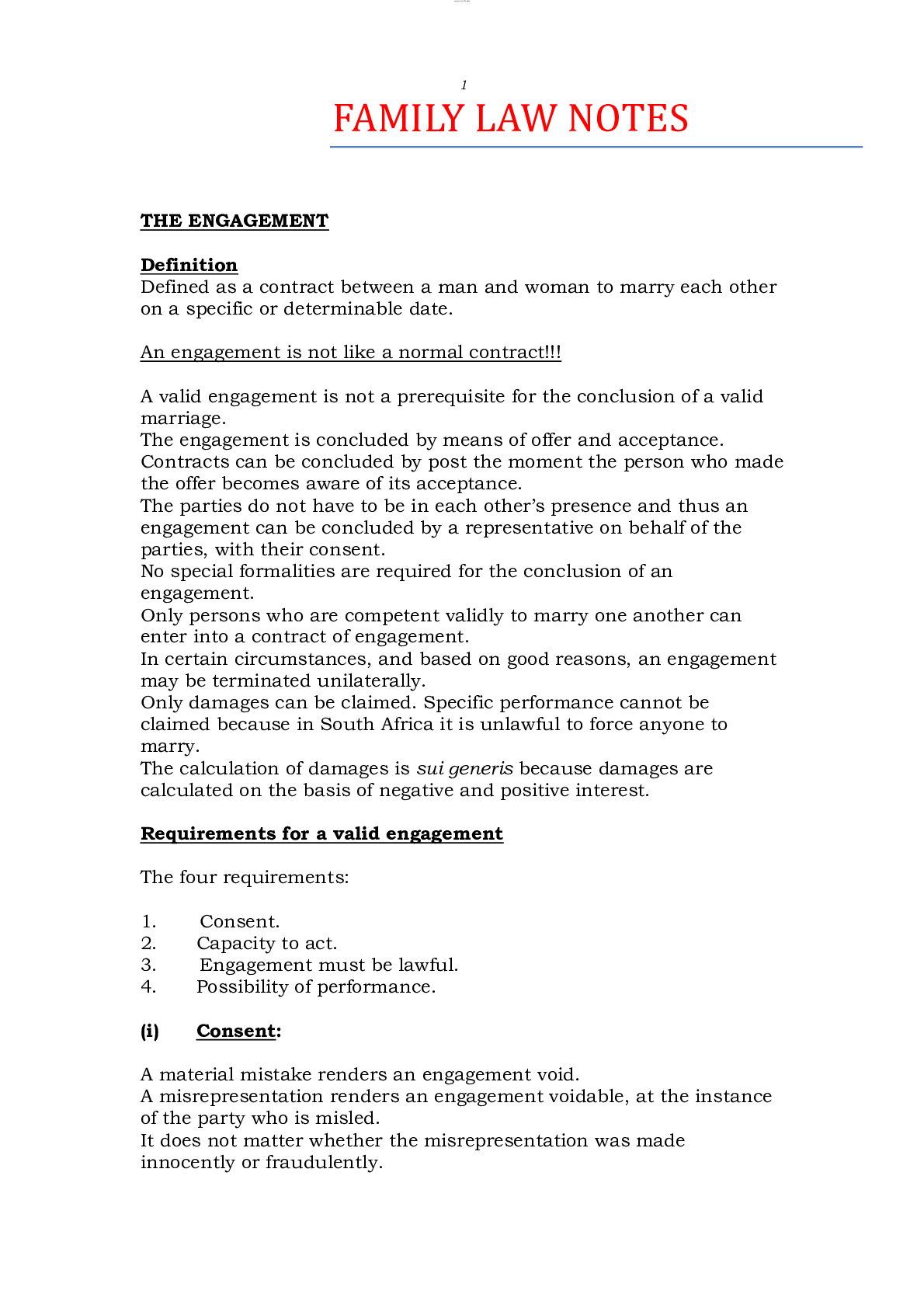
Reviews( 0 )
Document information
Connected school, study & course
About the document
Uploaded On
Jul 30, 2020
Number of pages
167
Written in
Additional information
This document has been written for:
Uploaded
Jul 30, 2020
Downloads
0
Views
190

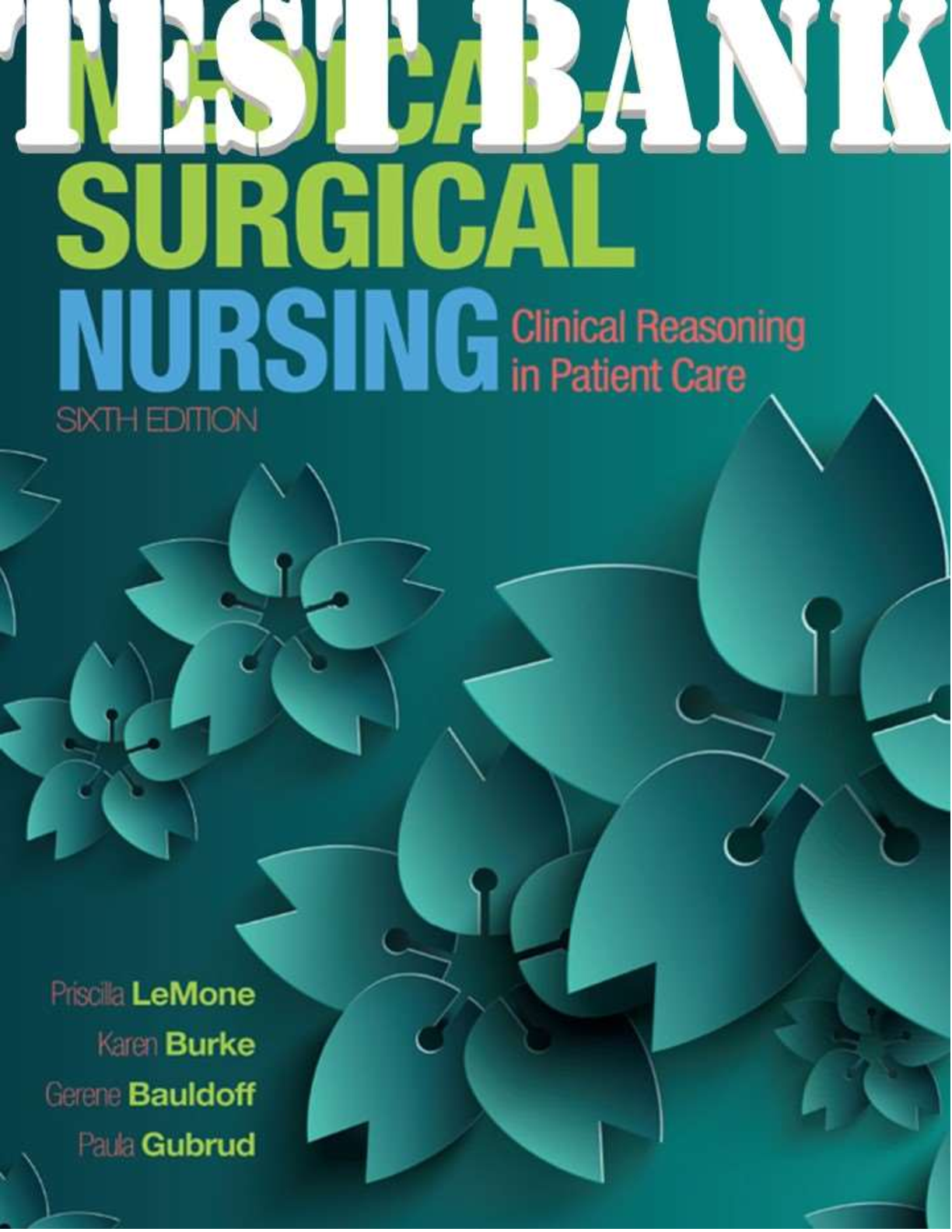
.png)

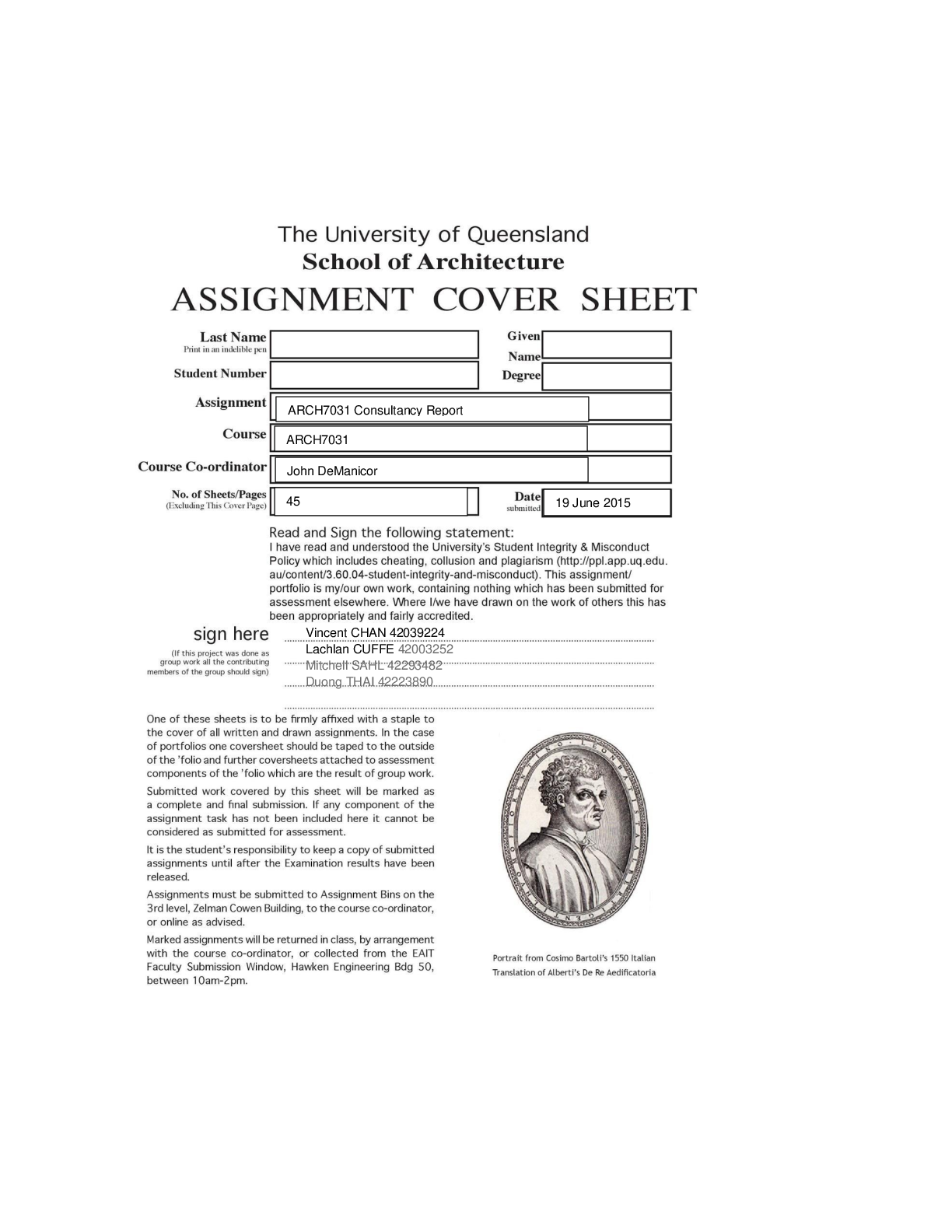

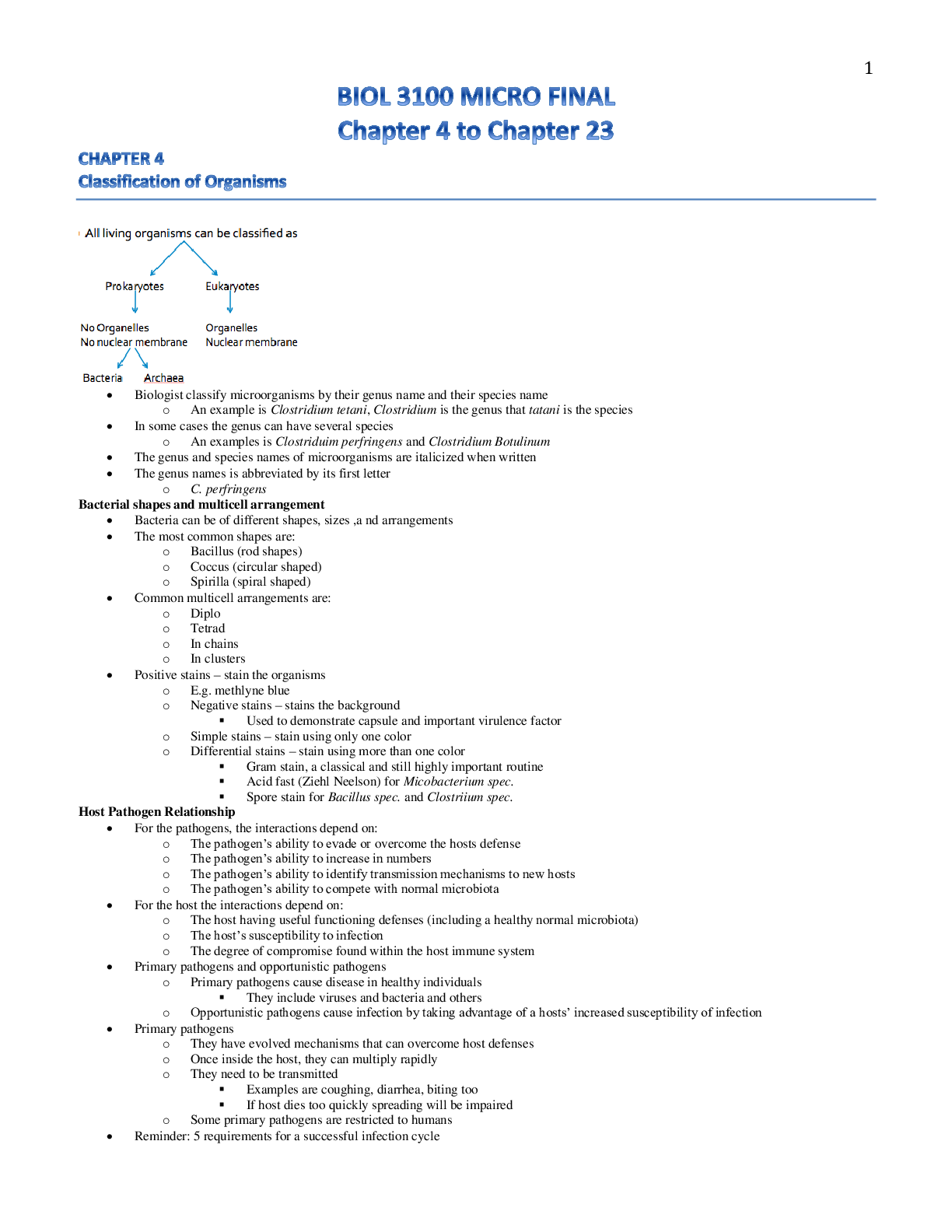

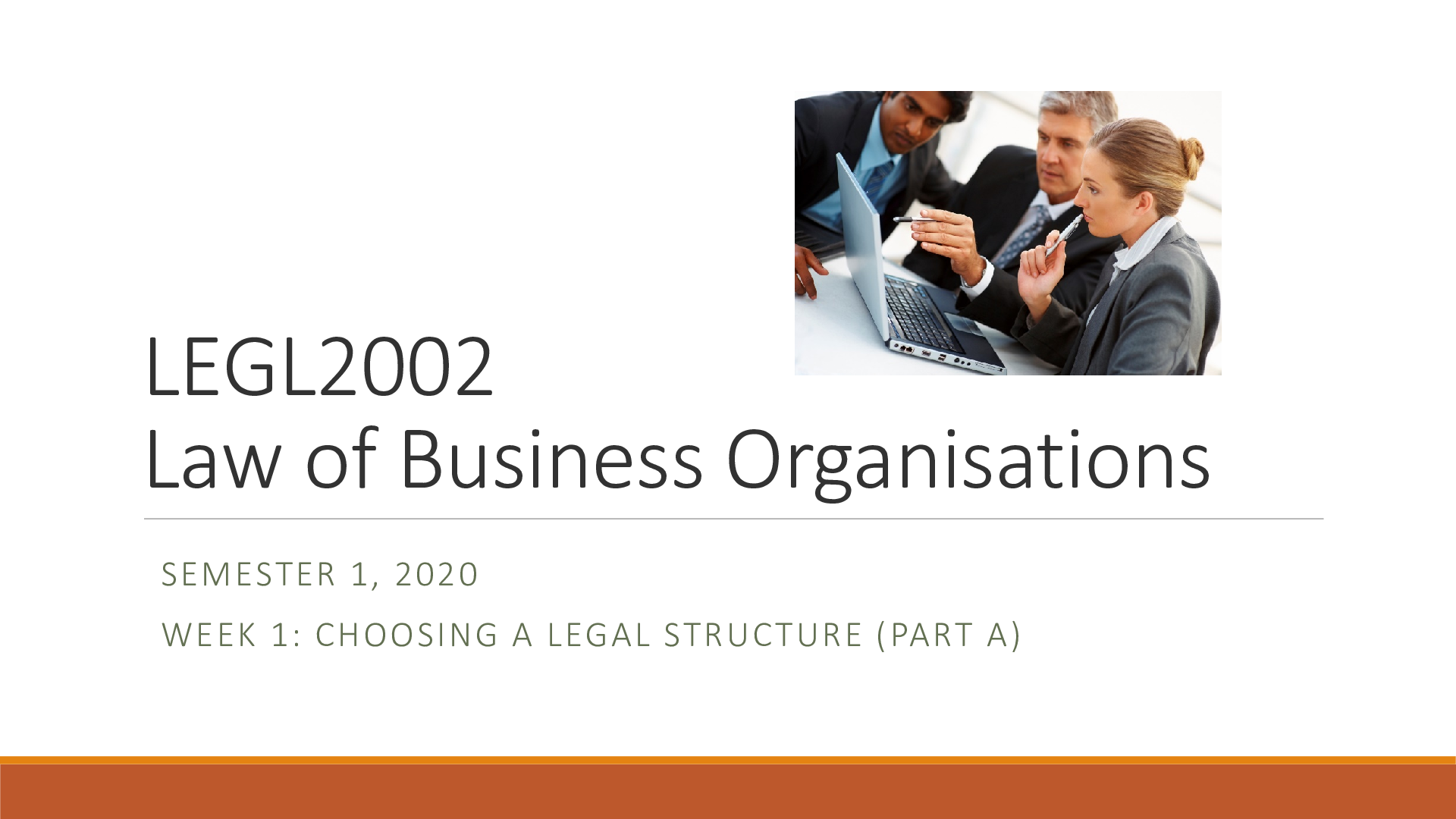

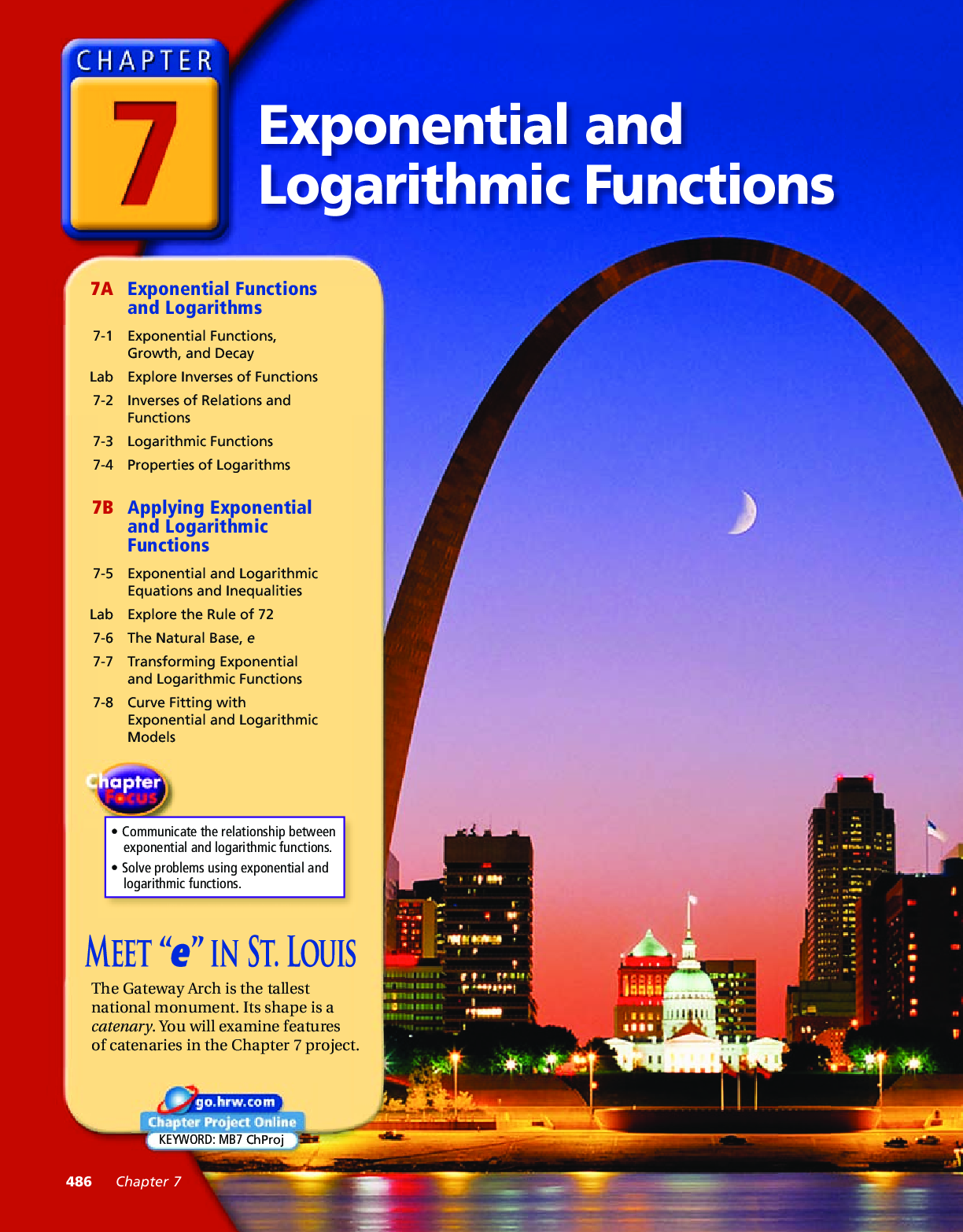
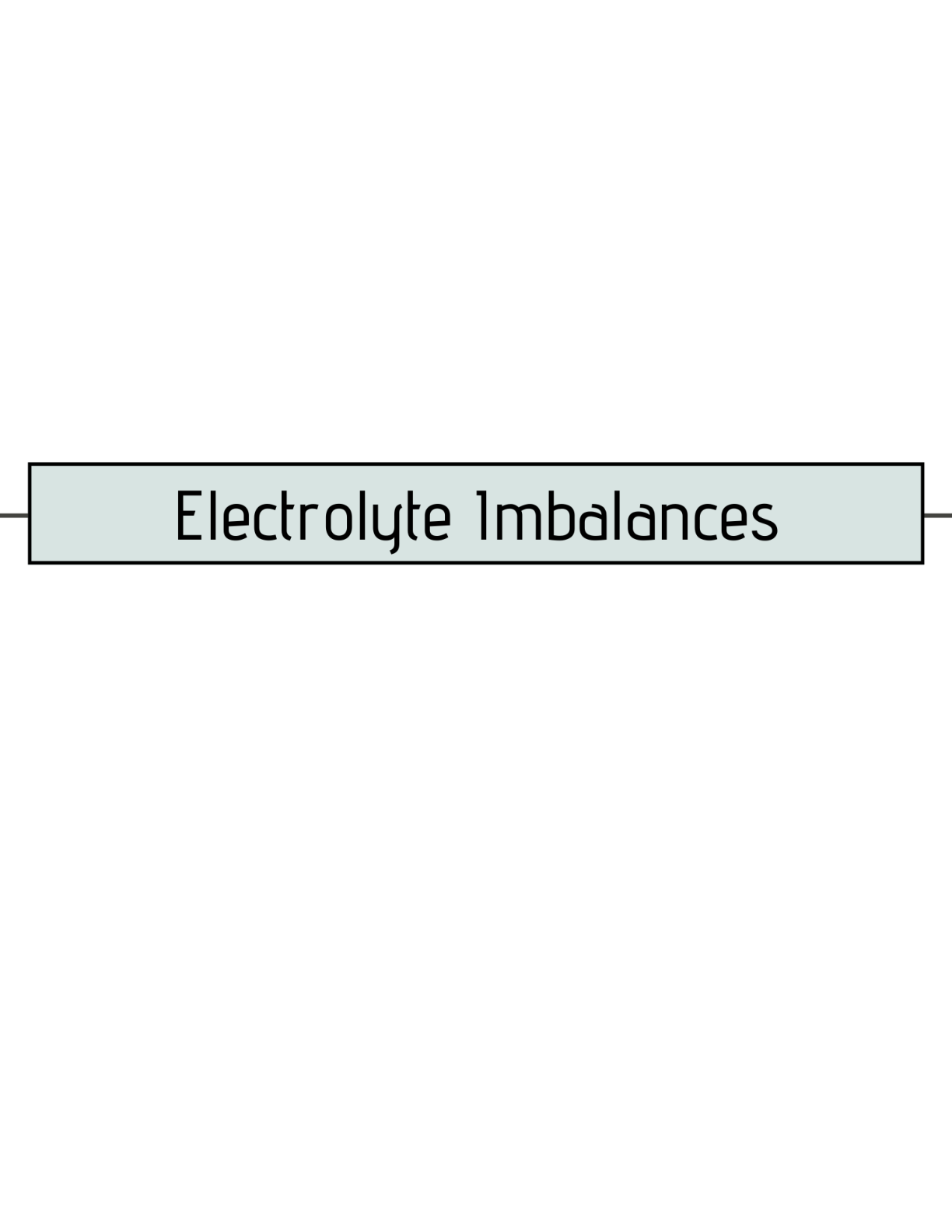
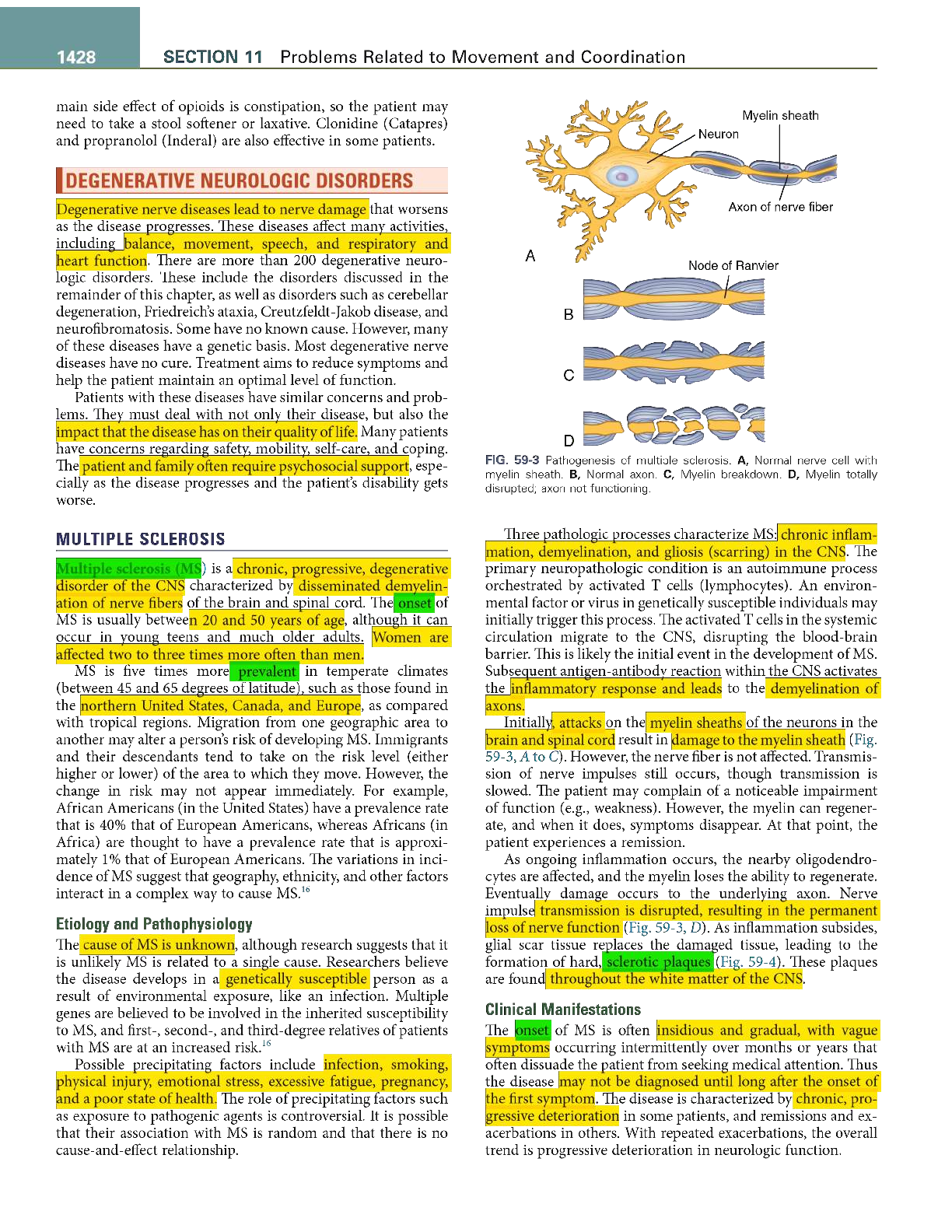

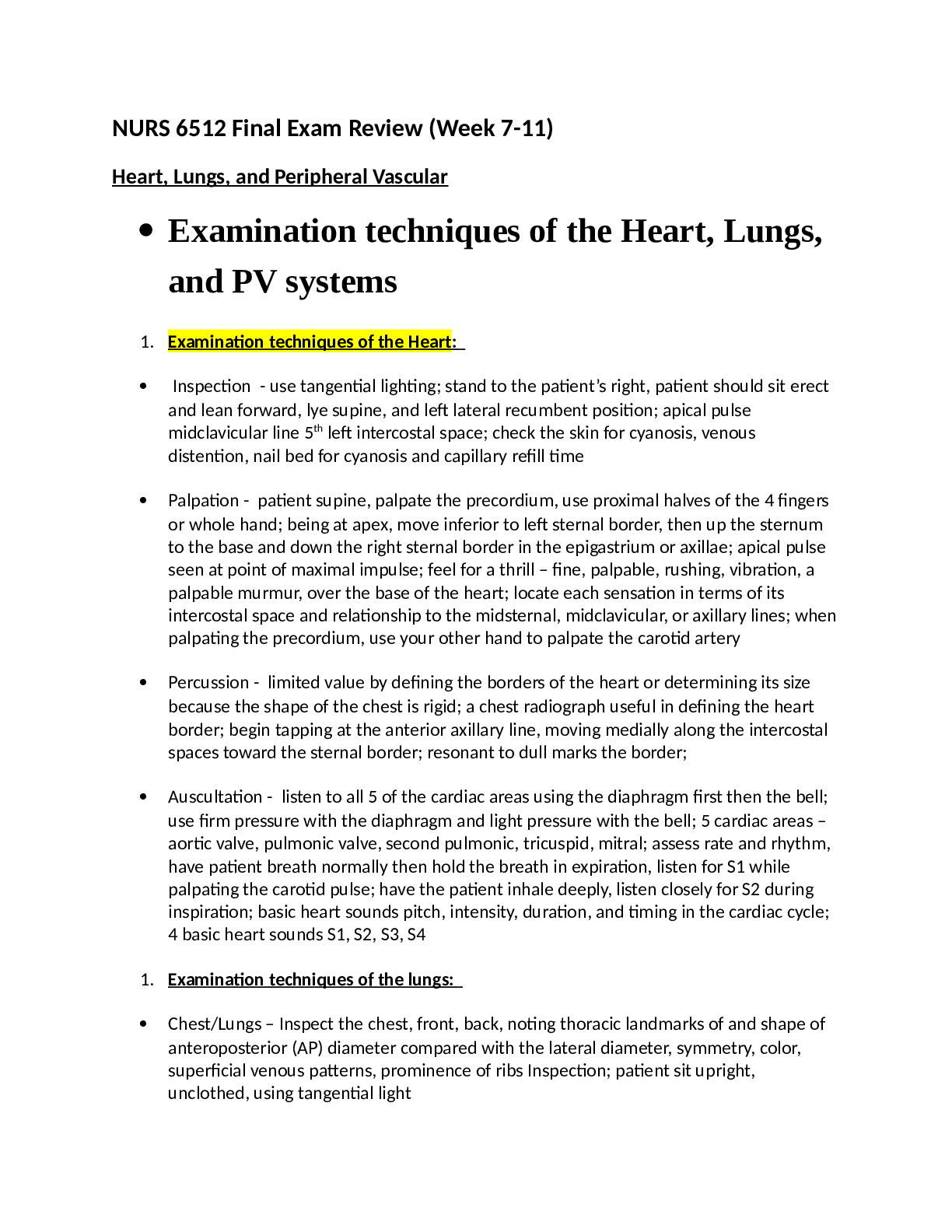
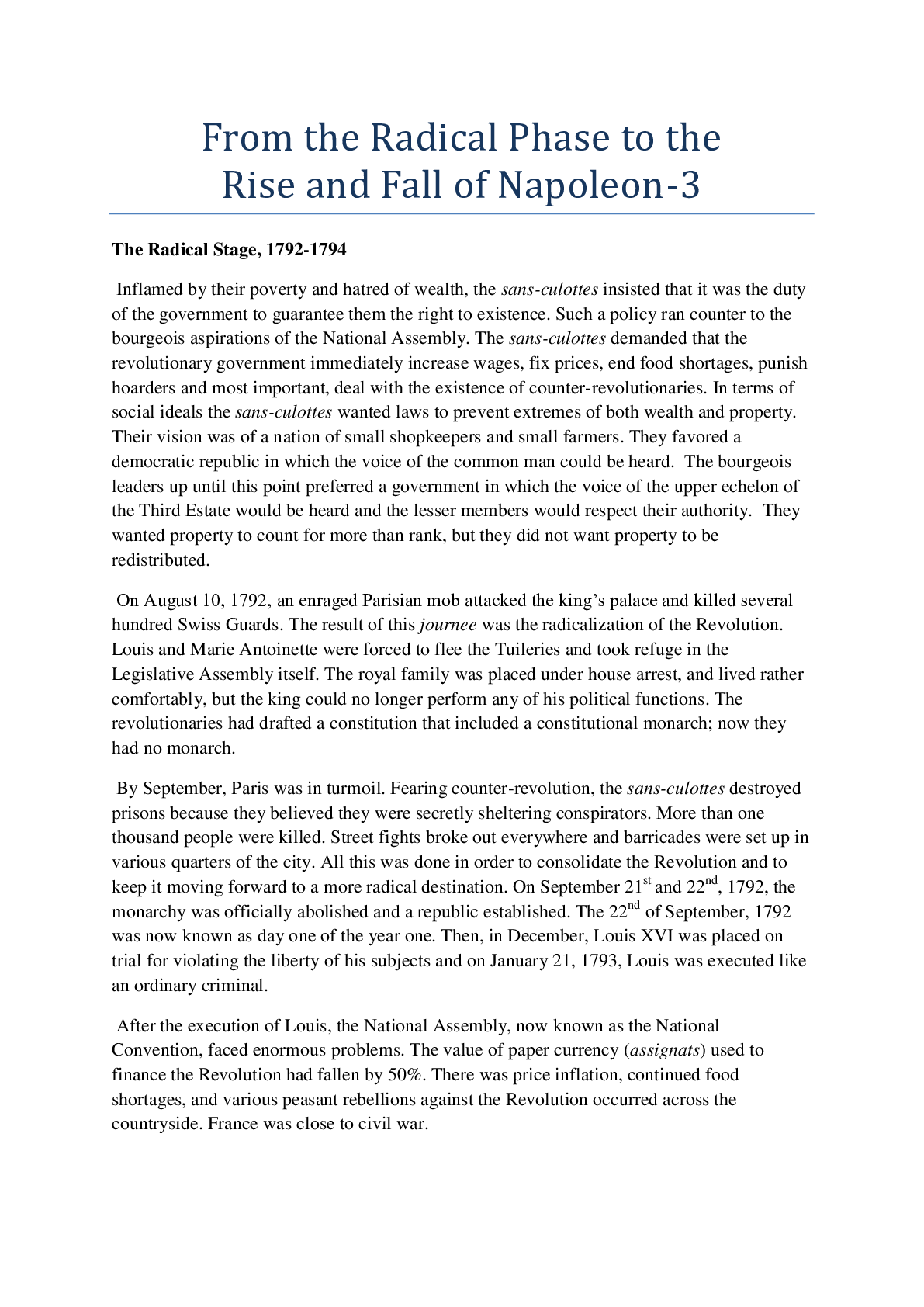
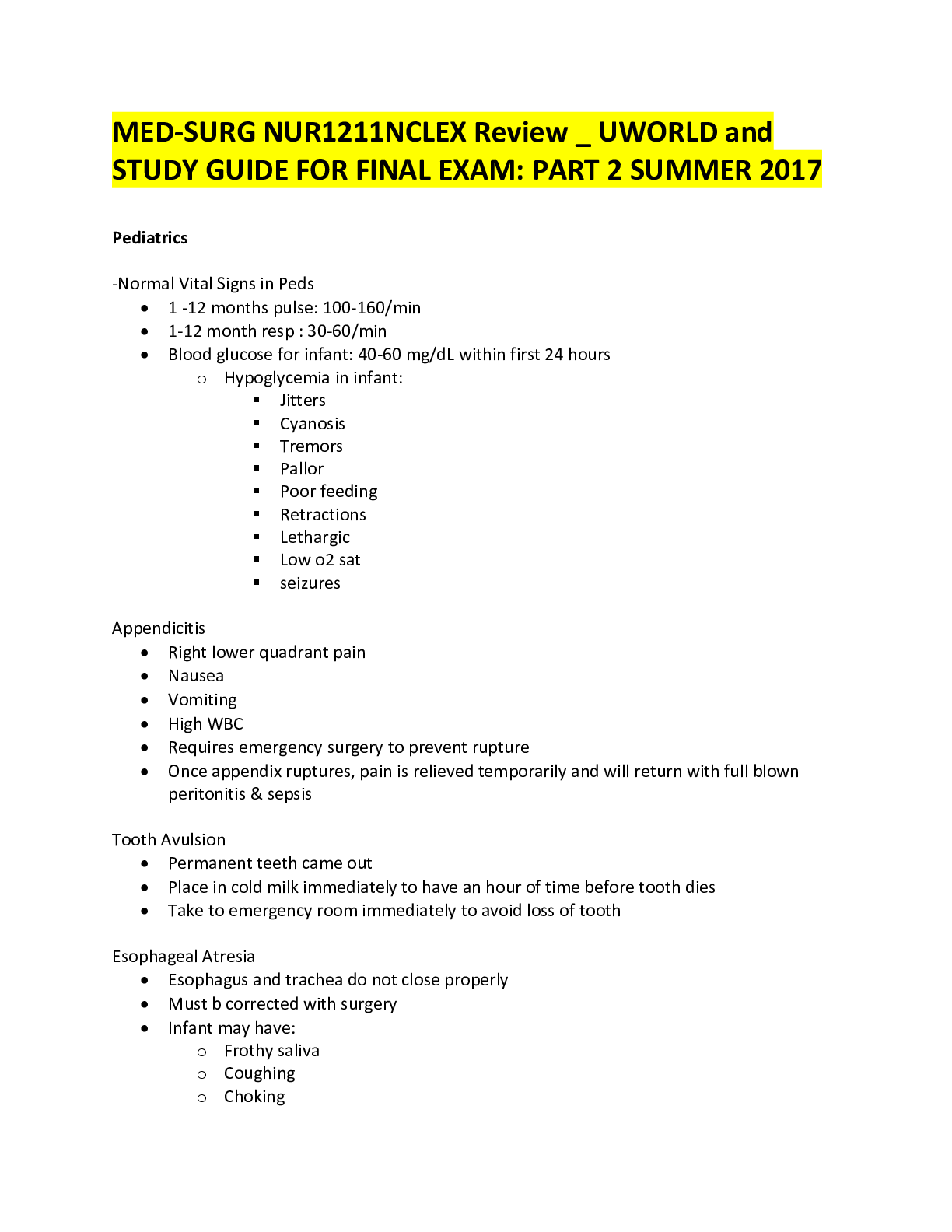
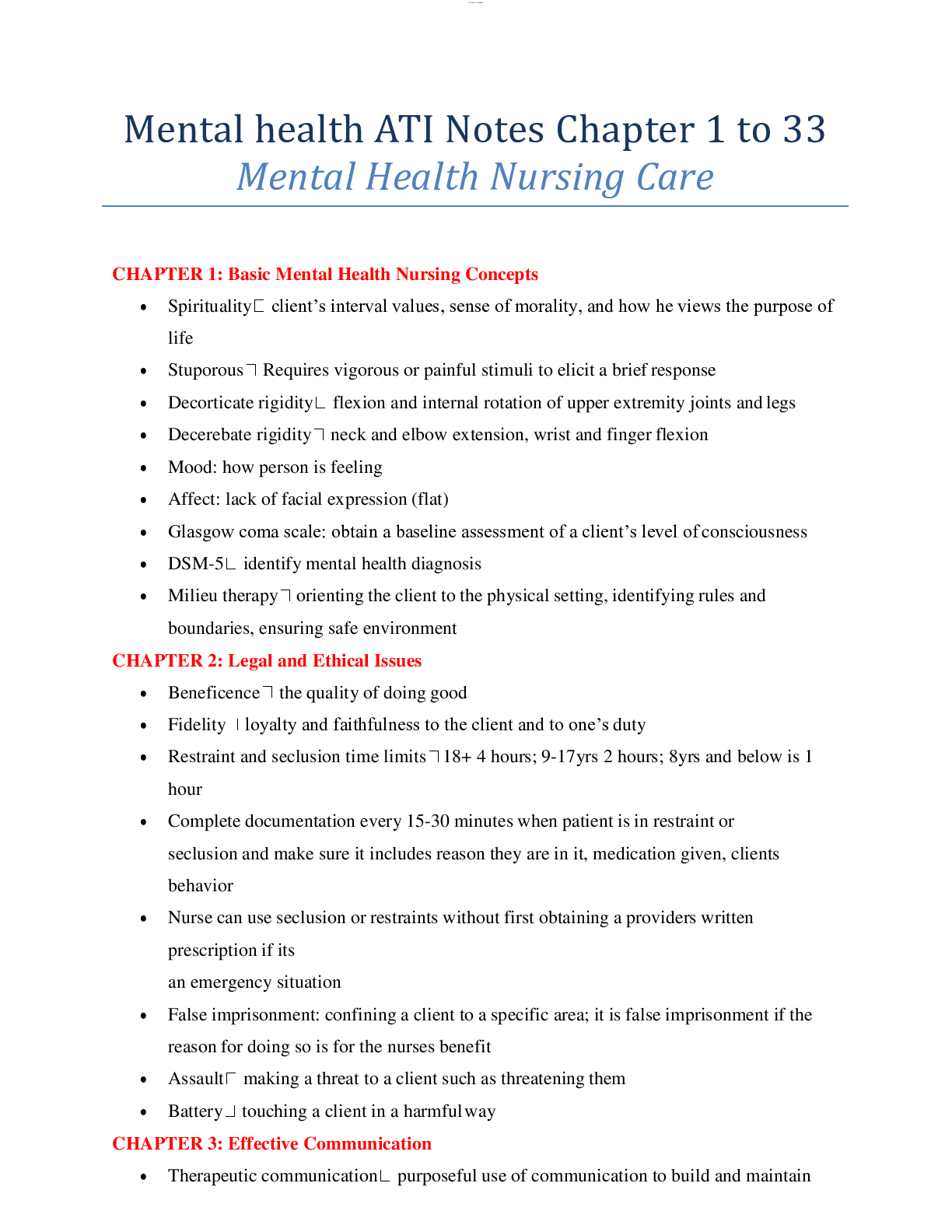
.png)
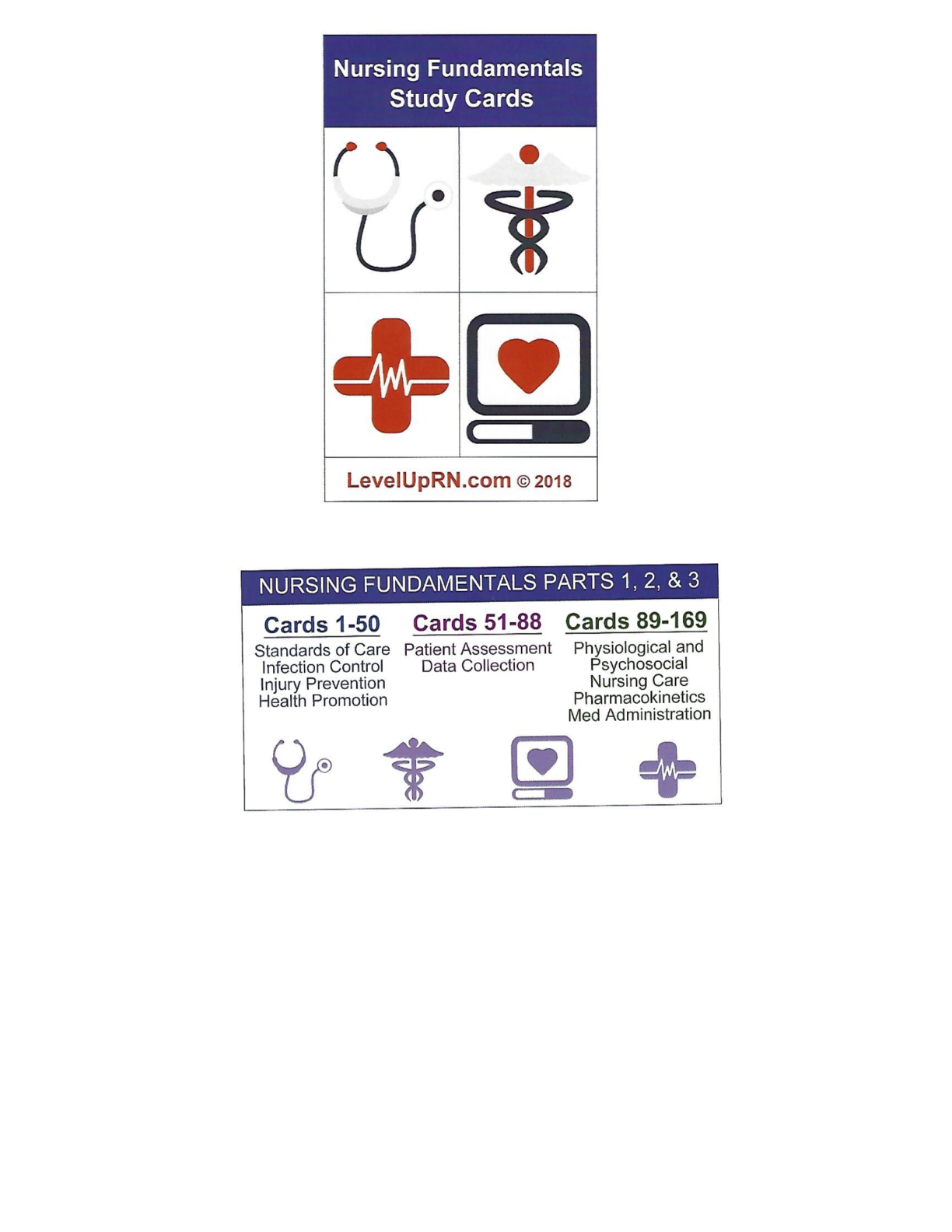


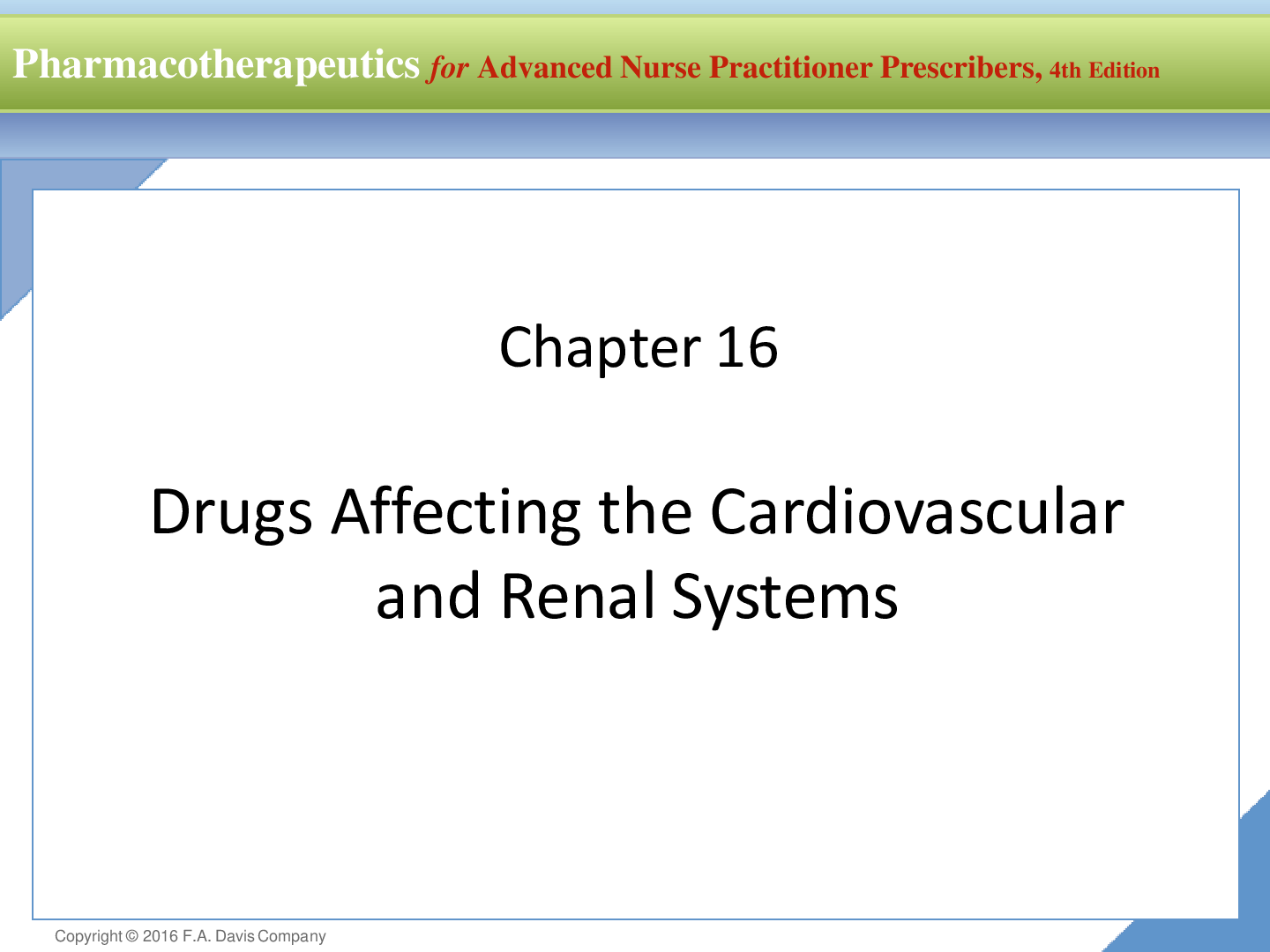
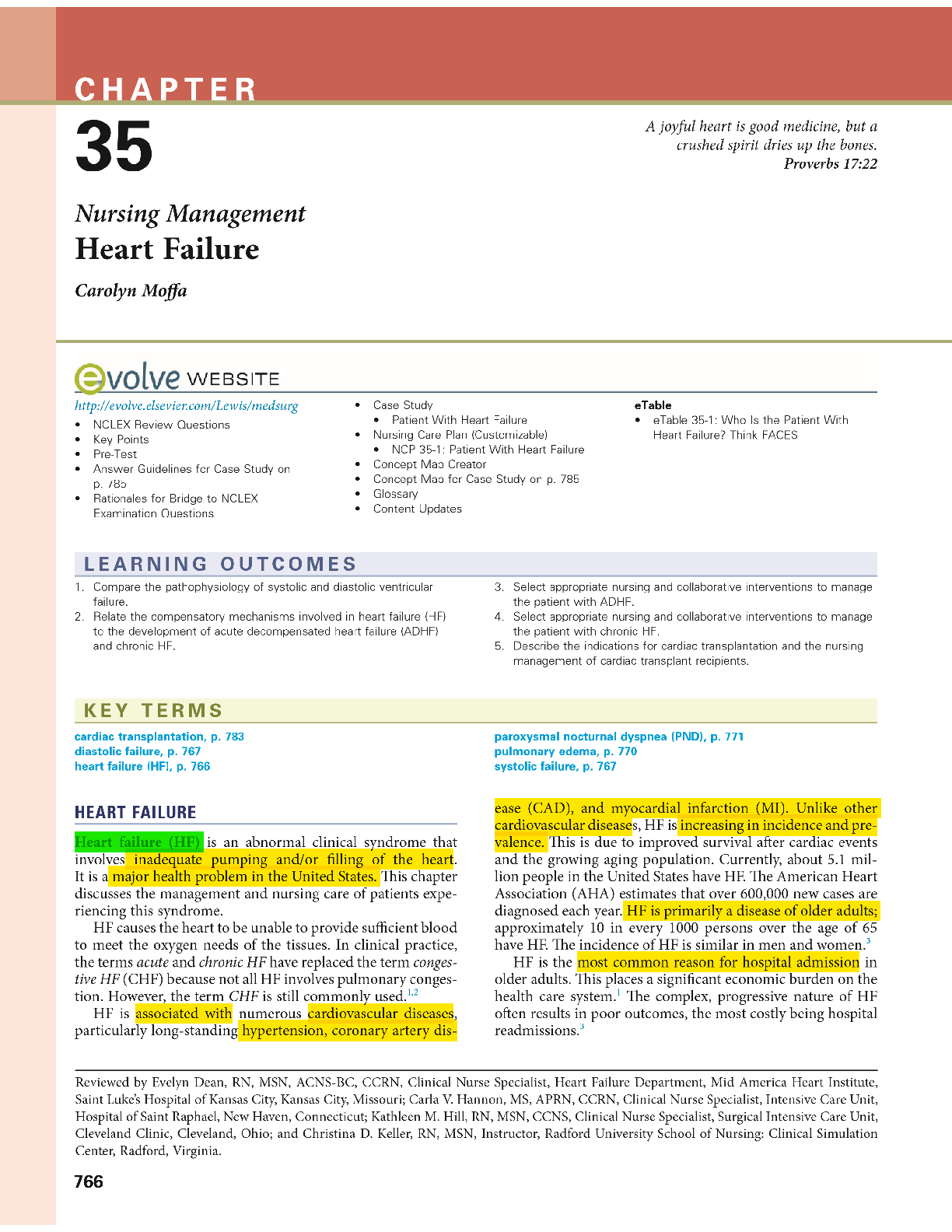
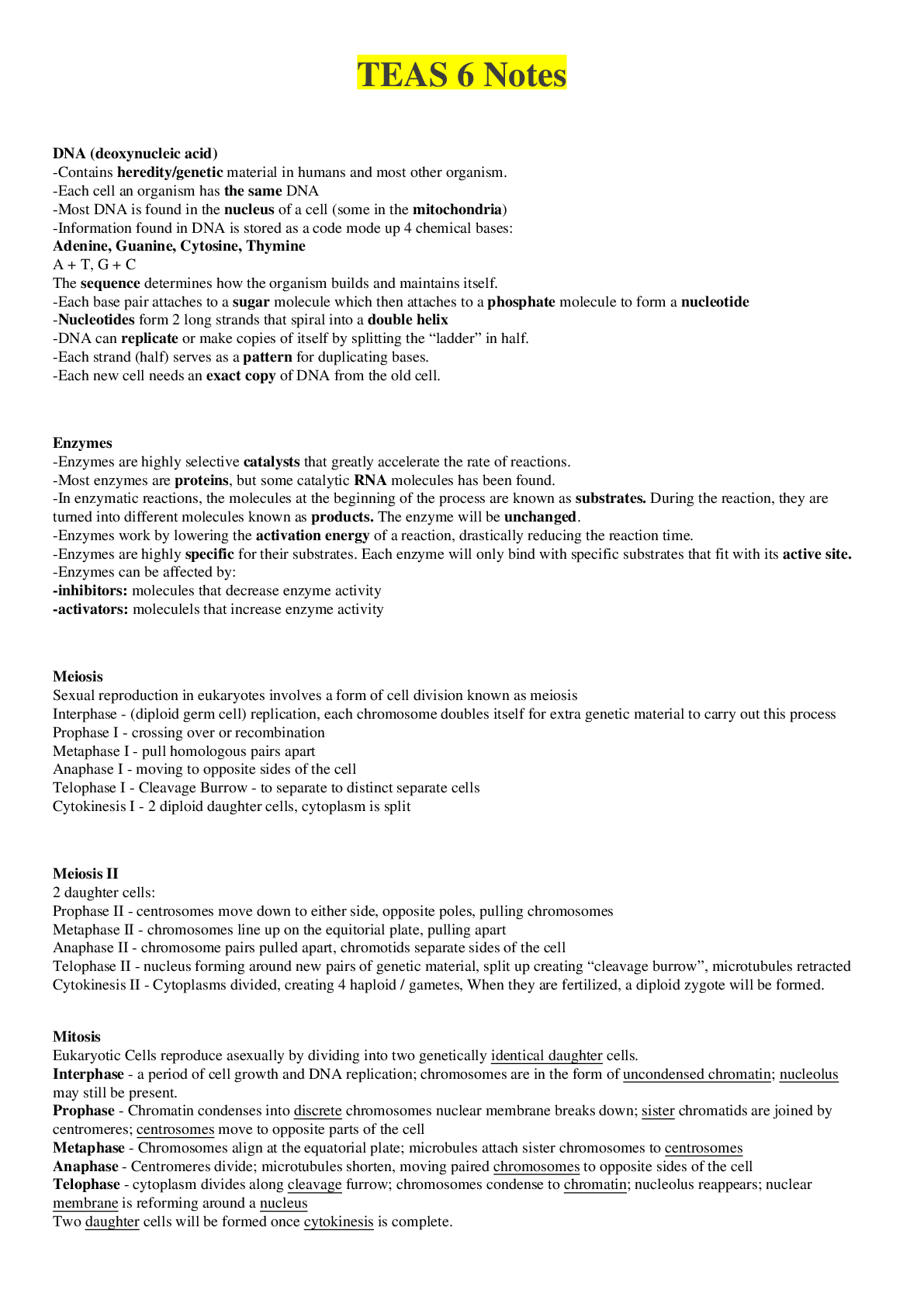

How Do Geographically Dispersed Teams Collaborate Effectively Paper.png)

